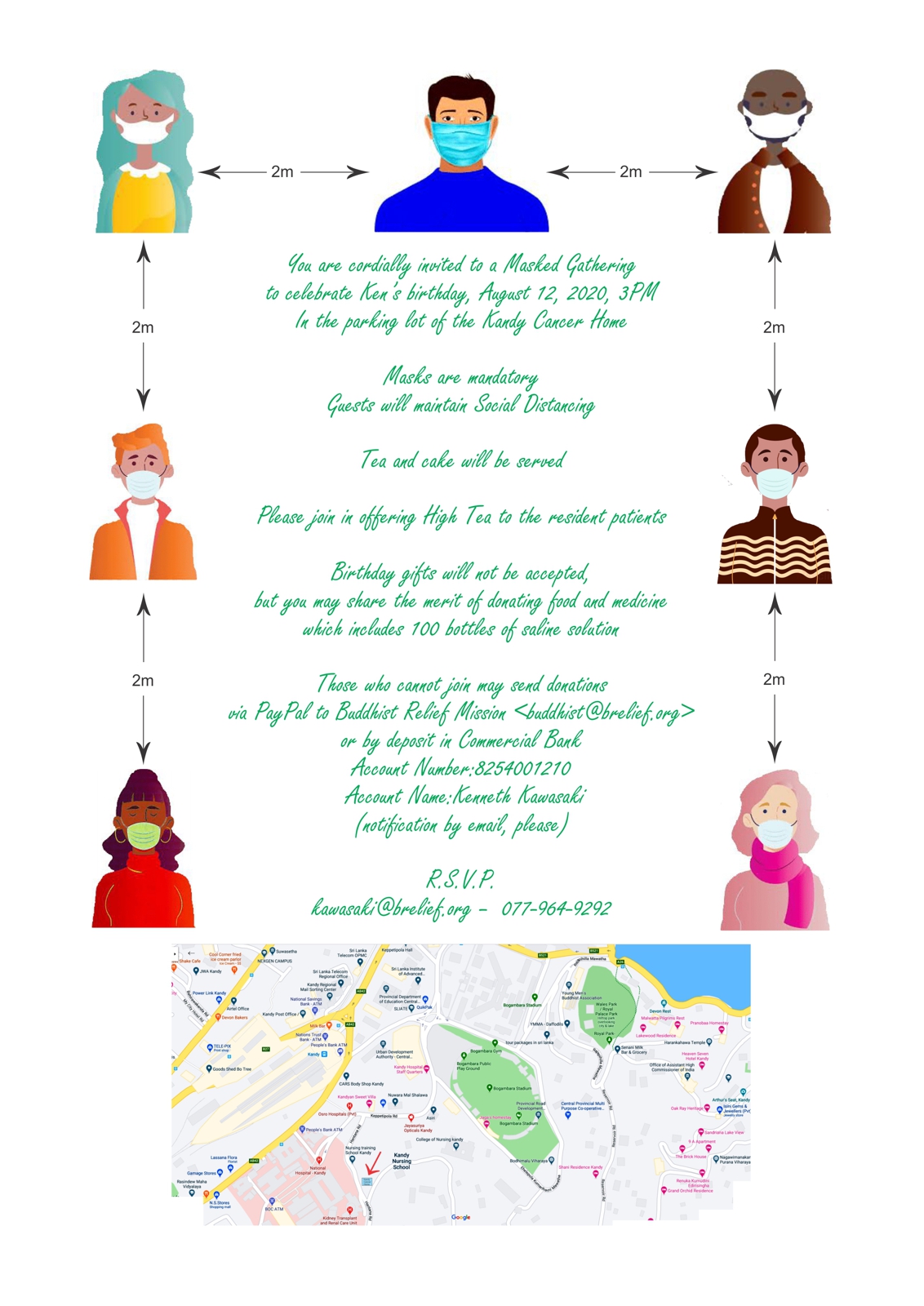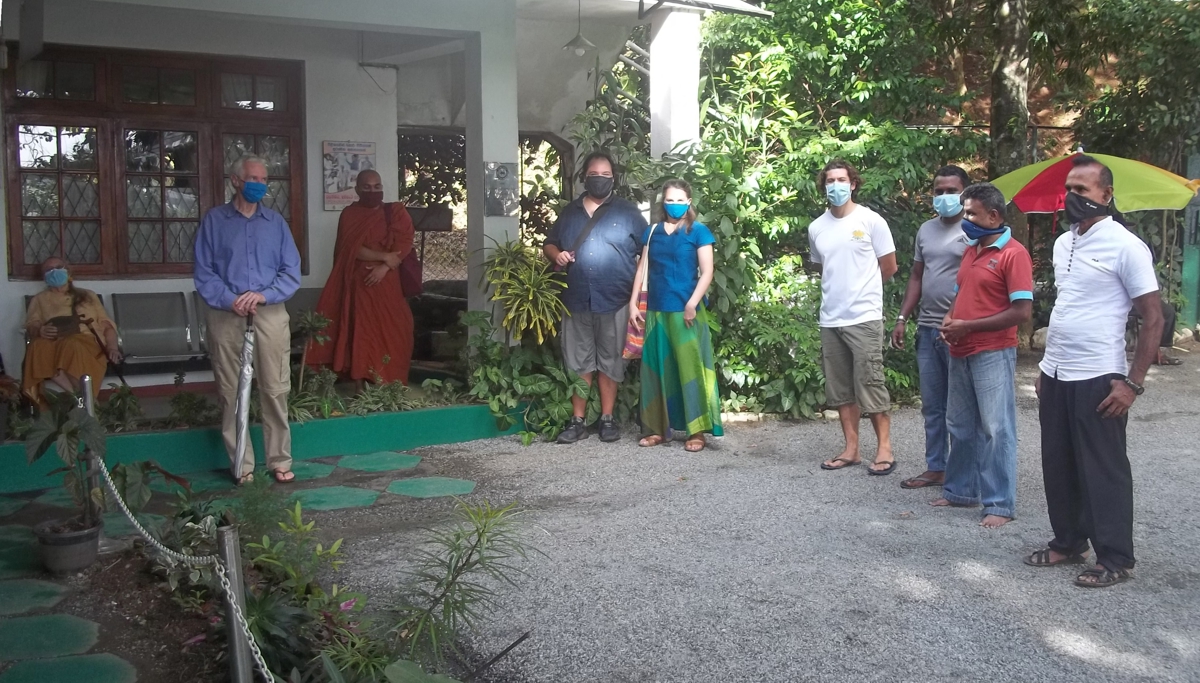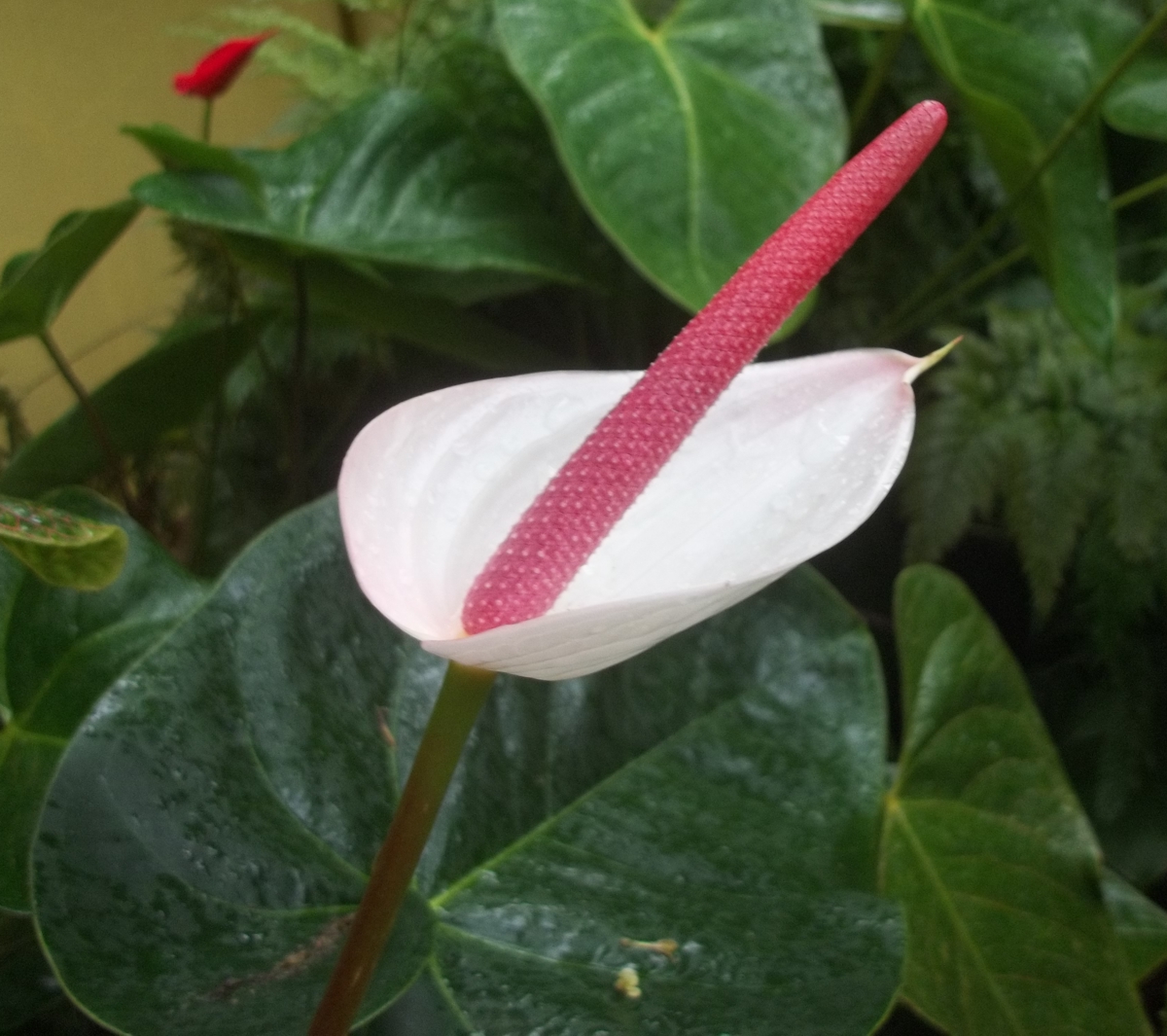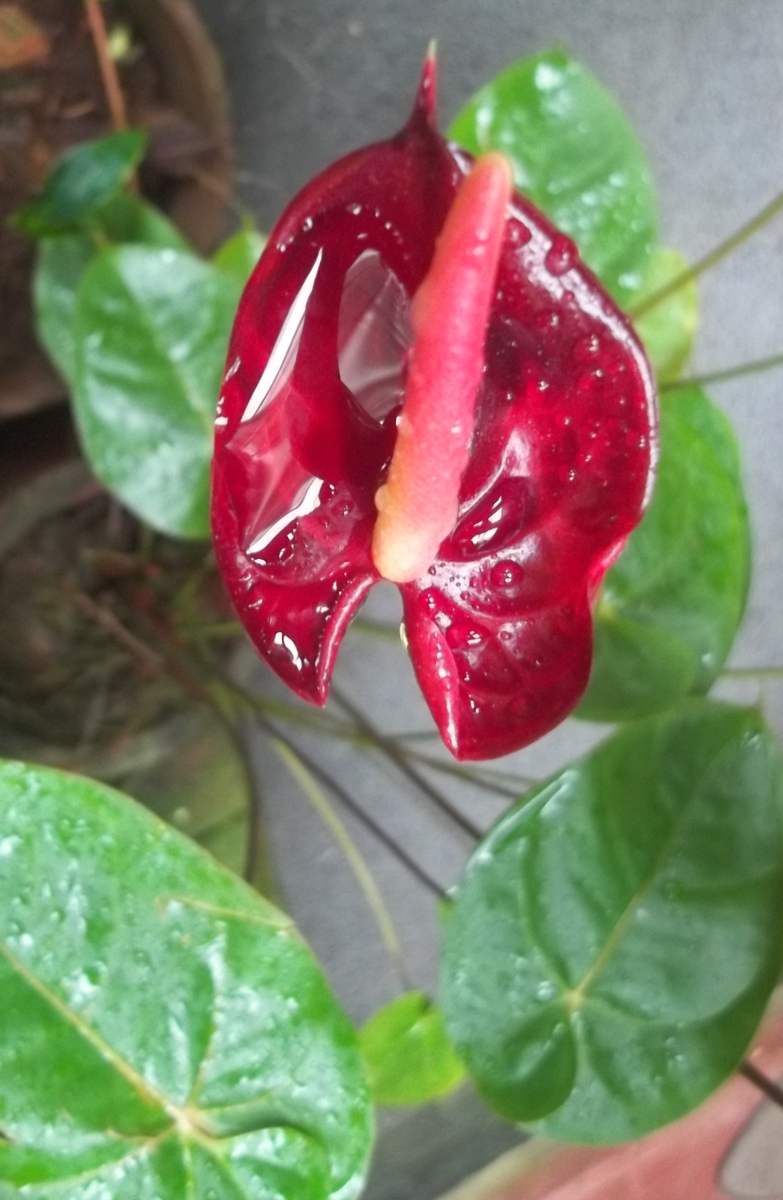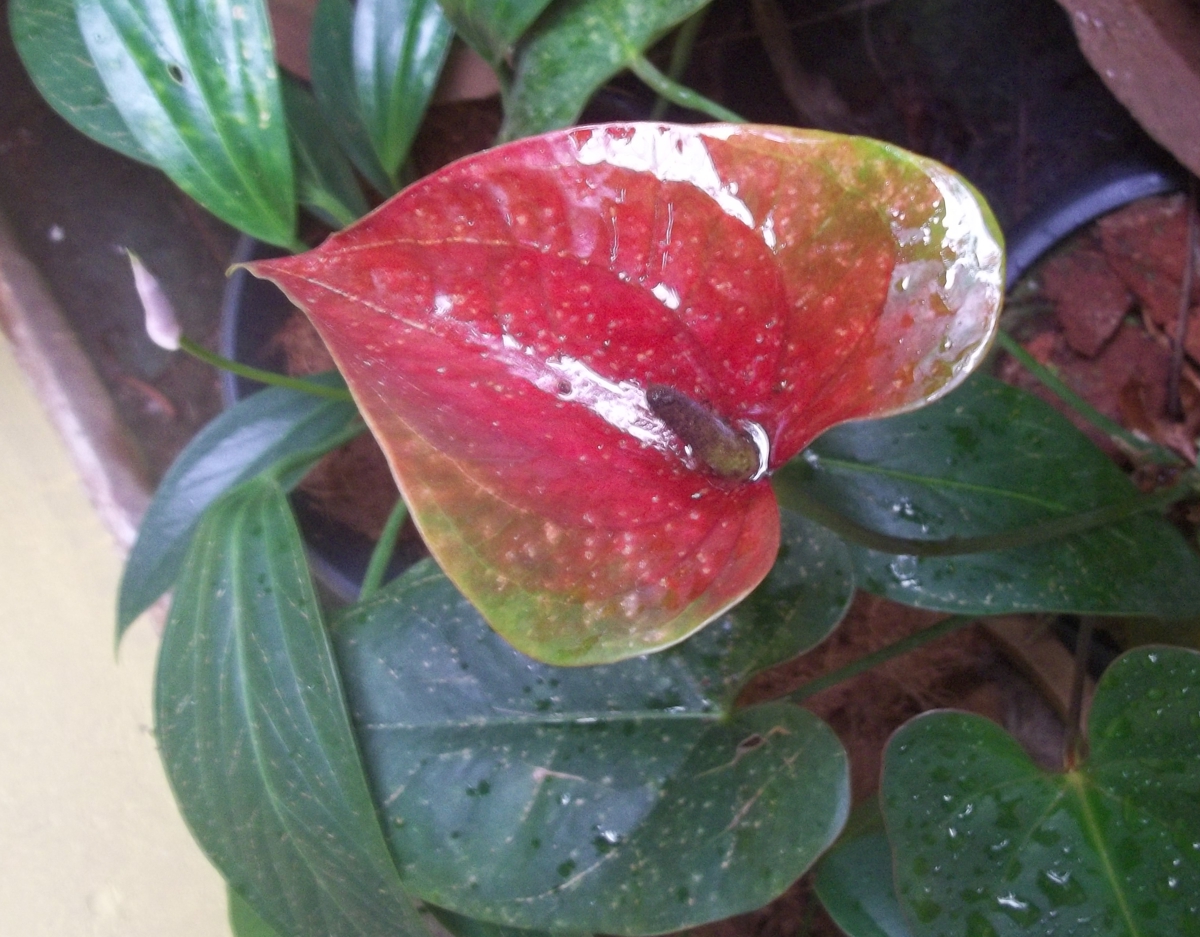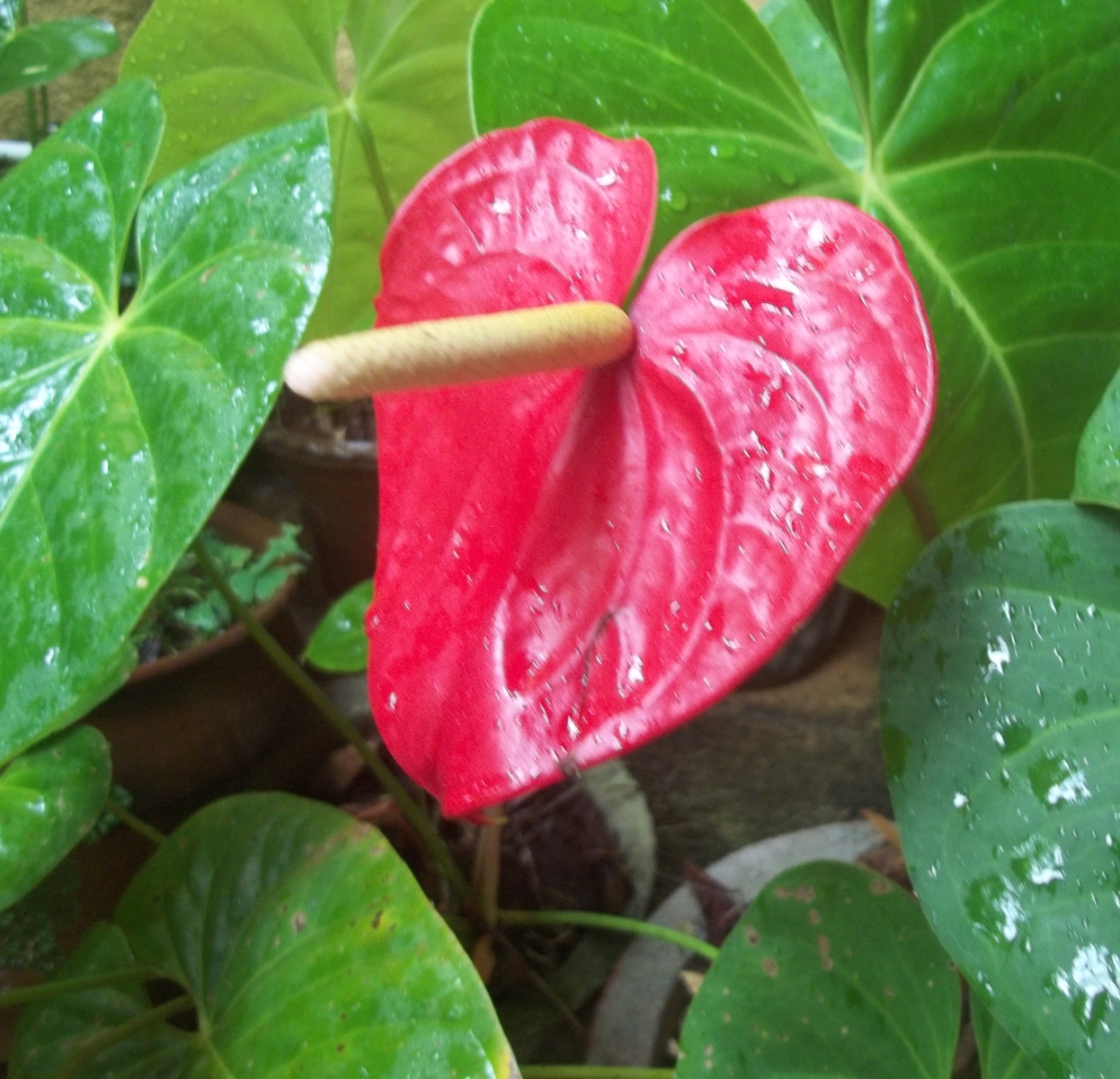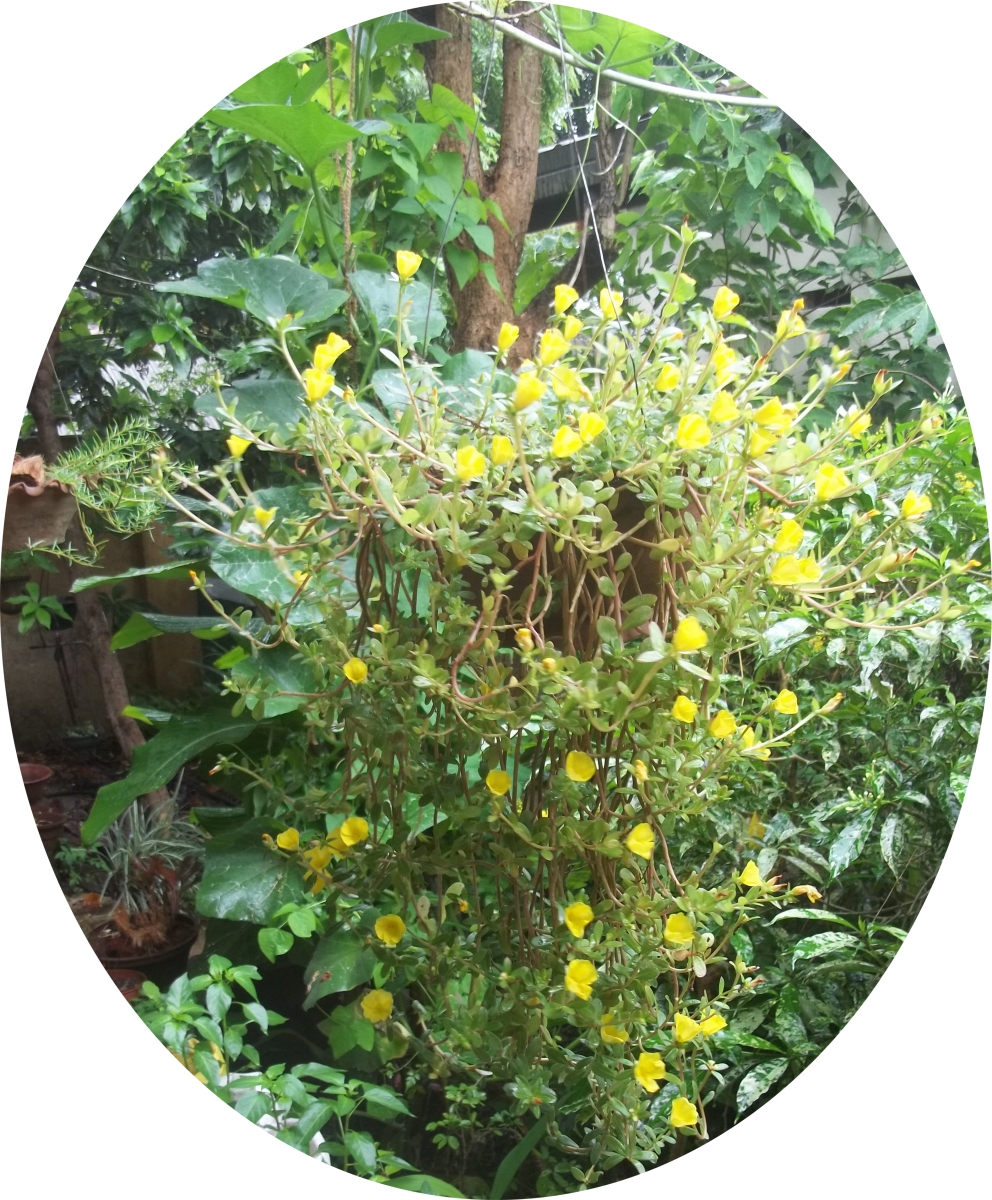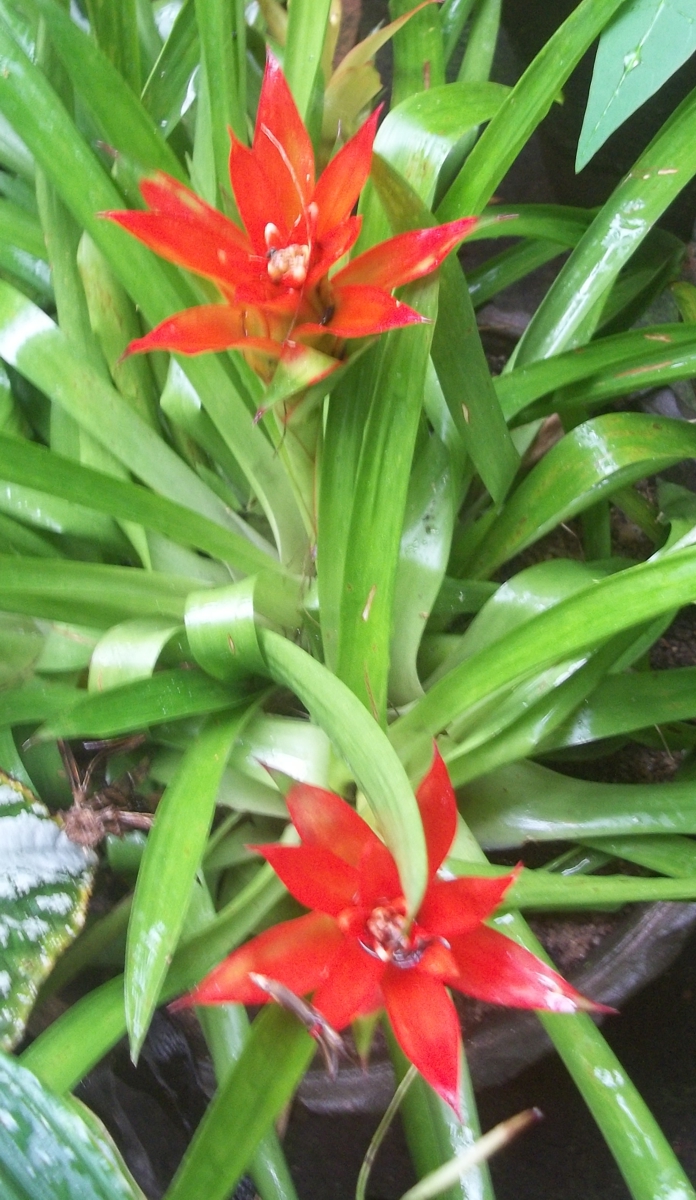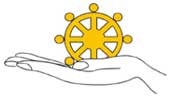I Ain't Got No Home, August 20, 2020
In the incessant deluge of grim. foul, devastating news items, one story caught our breath and lifted our hearts. Almost lost in the tsunami of disaster stories, surging pandemic cases and rising death tolls, recessions and depressions, vicious lies from public figures, local, national and international examples of fascism, racism, hate, feckless greed, police provocation and brutality, record heatwaves, torrential rains, hurricanes, and fires in Siberia and the Amazon, one small tale caught our attention and generated tears of joy and gratitude.
First, let us express our thanks to the real journalists who risk their lives to observe, question, and record what's happening. Without them we'd be blind. Thanks also to our parents and the teachers who taught us to care about the truth, to question, to think critically, and to always keep both mind and heart open.
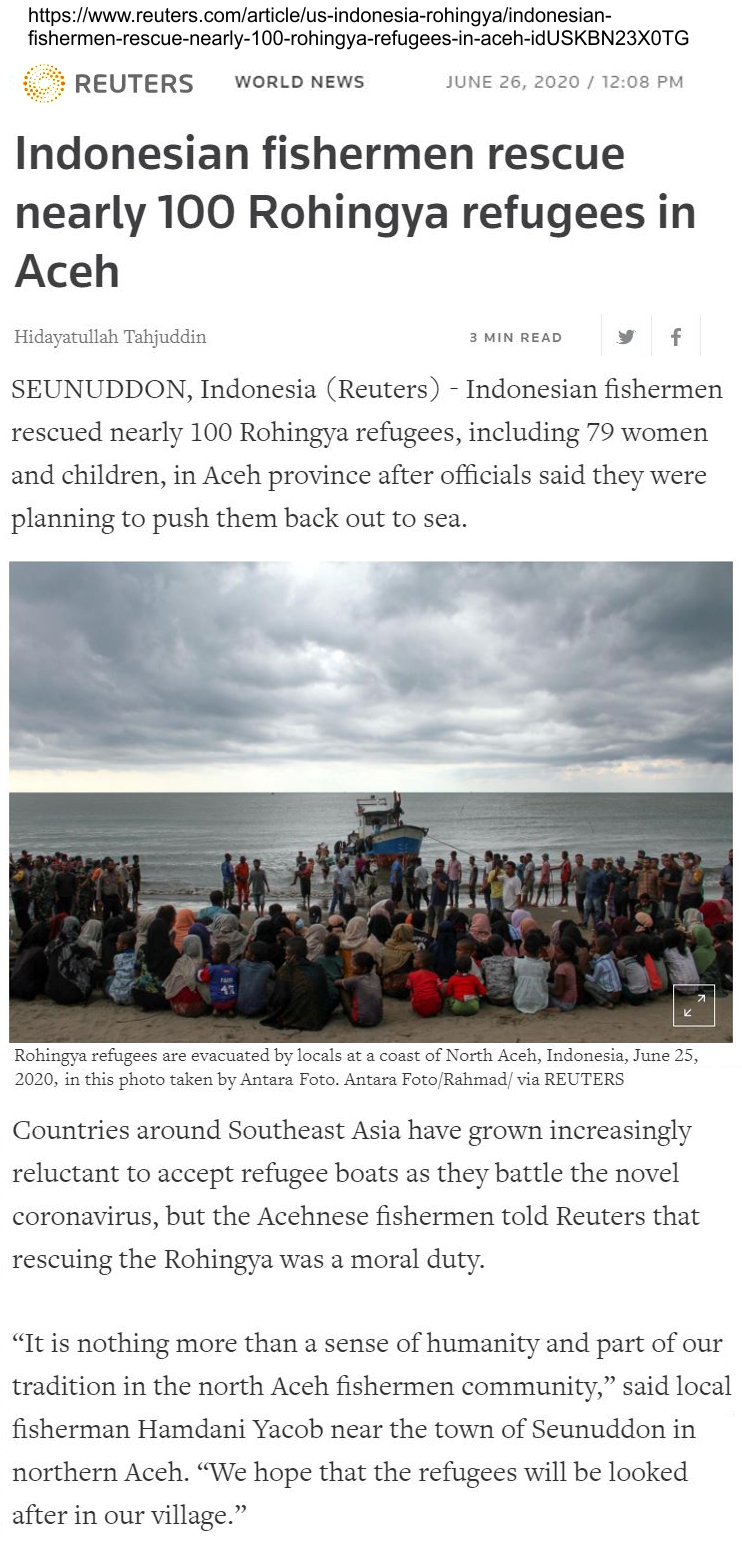 On the island of Sumatra, in spite of local officials and government authorities, the residents of a village in Aceh, ordinary fisherfolk and farmers, opened their hearts, their homes, and their mosques to a boatload of exhausted, desperate Rohingya refugees.
On the island of Sumatra, in spite of local officials and government authorities, the residents of a village in Aceh, ordinary fisherfolk and farmers, opened their hearts, their homes, and their mosques to a boatload of exhausted, desperate Rohingya refugees.
We have to remember that it was these Indonesian fishermen and villagers who suffered the most in the 2004 tsunami. Aceh was almost the epicenter of the earthquake which triggered the tsunami. Entire villages were completely wiped out.
The Rohingya refugees, driven from Burma by genocide, exploited and abandoned by traffickers, had been drifting at sea for four months, crowded in their small boat without space to stretch out. They had survived by drinking their own urine.
The concept of "a moral duty" and a "sense of humanity" on the part of the villagers of Aceh is in stark contrast to the amoral attitude of most of our leaders and the despair that so many are feeling now in the face of the pandemic and collapse of the ecosystem and, perhaps, of civilization itself.
As we watch our "normal" world turn into an unpredictable, unrecognizable pandemic world, with failures of institutions, disastrous, corrupt "leadership", without a predictable future, deprived of recognizable signposts and trustworthy plans, we remember the stark truth of The Four Dhamma Summaries:
|
|
|
The Four Dhamma Summaries
The world is swept away. It does not endure.
The world offers no shelter. There is no one in charge.
The world has nothing of its own. One has to pass on, leaving everything behind.
The world is insufficient, insatiable, and a slave to craving.
--Majjhima Nikaya 82
|
|
|
|
|
|
|
Reciting this frequently, however, does not necessarily entail understanding it. Nevertheless, these four sentences are a painfully apt description of the world as we're being forced to see it and to navigate in it today.
Like many, we were born with all sorts of privileges. Being American, white, well-educated, and economically secure, and coming from loving families, we have led charmed lives. Our parents had lived through the Depression, and we heard a lot of stories about that hardship, but that was history. Growing up in the '50s and '60s, the world and our society seemed to be stable--flawed, certainly--but basically stable. We were, to a great extent, shielded from upheaval, even though we got involved and hoped to change the world. Ken was the only young person from his church who spent a weekend with a black family in Cleveland's inner-city and two weeks in Atlanta. He was also the only one to take part in the March on Washington for Jobs and Freedom. As soon as Visakha entered Flint Junior College, she joined the NAACP. While there she wrote an article about Cuba that got the student newspaper shut down. Serving with the Peace Corps in the Philippines, she learned first-hand about US colonial history, especially visible in Marawi, with its rich Maranao Muslim culture. During grad school, she joined anti-Vietnam war protests. After some years together in Japan, we took a year to travel back to the US, often staying with Servas hosts who gave us deeper insights into their communities than ordinary tourists could hope for. In Flint, Ken taught English to resettling refugees while Visakha managed a program called "The Parent Place." Happy to return to Asia, we spent two years working in Indochinese refugee camps in Thailand and the Philippines. We were in Burma during August 1988 and saw the massive protests of workers, students, and monks which was bloodily suppressed by the Tatmadaw, forcing many to flee to the border areas as refugees. We established both Buddhist Relief Mission and Burmese Relief Center--Japan, but again, becoming a refugee was something that happened to other people. We knew that many of our Indochinese refugee students and our Burmese friends had been teachers, professors, doctors, artists, farmers, fishermen, and even wealthy scions of old families, generals, and royalty, but they had were from "third-world" countries, which were prone to unrest. America was a "first world" country, a democracy with a proper constitution. Our American passports (and secure responsible jobs in Japan) protected us.
Today, however, that illusion of stability is gone. The false security of "American exceptionalism" that we grew up with has been shattered. All the things that we took for granted--the Constitution, the rule of law, reliable institutions, equality and human rights for everyone, social security, basic health care, public schools, affordable higher education, unemployment benefits, housing security--are being destroyed. We are forced to realize that we are no longer protected from disaster and the specter of fascism.
When we see these harsh new realities, we think of Lily's oft-repeated phrase, "They aren't going to die," which she applies to those folks who are rich, greedy, selfish, and mean. Indeed those who should protect the people and care about their welfare are all too often the ones enriching themselves and seeking only power and profit for themselves, their families, and their cronies. One cannot help but wonder why they do not realize that, one day, they, too, will die from this pandemic or some other illness, from old age, or by an enemy's hand, and all they will take with them will be their kamma. Kudos to the remarkable Palestinians who have long endured the unendurable, the outraged, suffering residents of Beirut, and the courageous people of Belarus who dare to stand up to a brutal brazen dictator despite arrest and torture. Obviously, those who claim that "All Lives Matter" don't believe it at all!
Today, we are all refugees, whether we know it or not, admit it or not. We have no reliable place to be. We are vulnerable to loss of everything and adrift at sea.
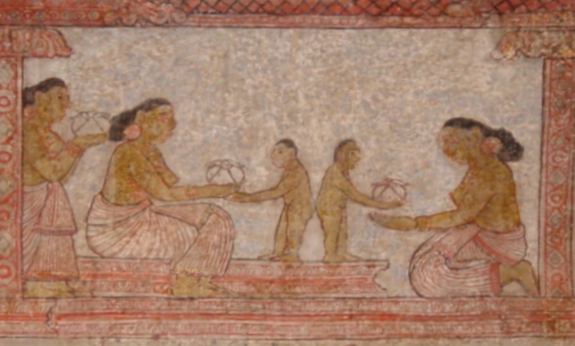 |
|
 |
|
| Vessantara giving gifts as a child, a painting in Dlegoldoruwa, Kandy |
Vessantara giving away the elephant, a painting in Dlegoldoruwa, Kandy |
|
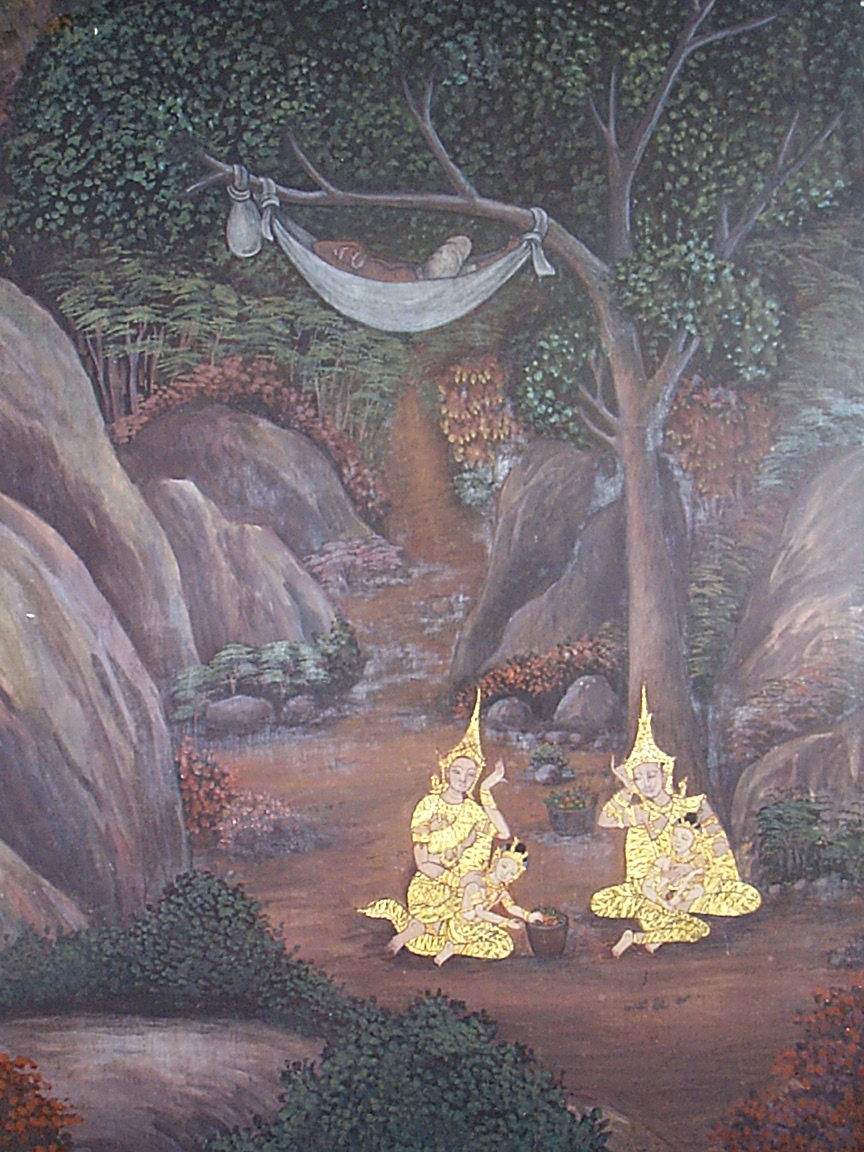 |
|
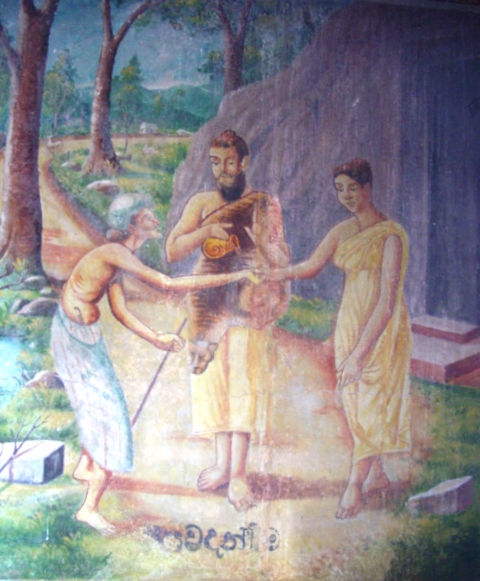 |
|
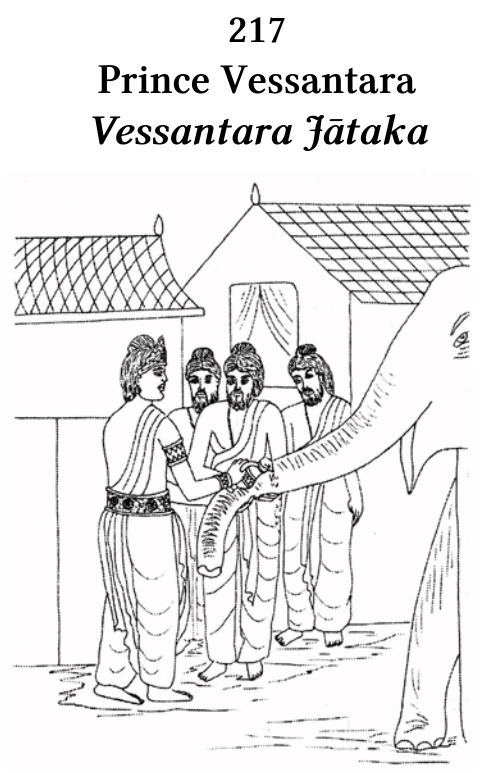 |
|
| Vessantara and Maddi as refugees in the forest, a Thai painting |
Vessantara giving away Maddi, a painting in Gadaladeniya, Pilimatalawa |
Click the image to read the Jataka Tale |
|
|
|
|
|
|
|
|
|
In the final Jataka, Prince Vessantara was exiled from his father's kingdom because he enraged the populace by giving away his precious white rain-producing elephant to emissaries from a neighboring drought-plagued kingdom. He had no inkling, however, that this deed would lead to such a disastrous result. He was merely fulfilling his vow of generosity. The kingdom of Sivi was as stable as any modern developed nation. Vessantara, the heir apparent, was well-educated and wealthy; he was, after all, the heir apparent. He had led a life of strict morality and goodness. Suddenly, however, all that was taken away. His world was turned on its head, and he became a refugee. Accompanied by his devoted wife, Maddi, and their two little children, he left for the wilderness.
From his birth, Vessantara's determination was to give whatever he was asked for. As an eight-year-old child he thought:
|
|
|
"Everything that I give comes from outside. This does not satisfy me. I wish to give something of my very own. If someone should ask for my heart, I would tear it out and give it. If someone asked me for my eyes, I would pluck them out and give them. If someone asked for my flesh, I would cut off every bit from my bones and give it." |
|
|
|
|
|
|
In his great donation before he left the kingdom, although he never touch alcohol himself, he even offered hard drink to those who required it. Nevertheless, after he had handed over his beloved children to Jujaka, a greedy brahmin who wanted them as slaves for his nagging young wife, Vessantara trembled violently and wept.
|
|
|
As he stood alone in the hut, his love for the children welled up in his mind. The vision of the brahmin beating them was more than he could bear. He felt an urge to follow Jujaka, to kill him, and to bring the children back. He even picked up his bow and started for the door.
"No!" he thought, restraining himself with great effort. "To give a gift and then to regret it would be a great sin. That is not the way of righteousness. Although the children are suffering, I cannot ask for them back. It's wrong to rescind a gift once given. I must not even allow myself to feel any pain."
|
|
|
|
|
|
|
Like many men, Vessantara underestimated his wife. He misjudged Maddi's courage and commitment to his quest for Buddhahood. Maddi unfailingly supported Vessantara and understood his need to perfect his generosity to acquire omniscience. When he reluctantly explained that he had given away the children, she gently reproached his lack of confidence in her.
|
|
|
"My dear, if you gave the children to a brahmin, why didn't you tell me? Why did you let me weep and carry on? ... I know that there is no greater gift than one's children. Set your mind at ease. My dear husband, in a world of selfish men, you give gifts with a lavish hand. Your generosity does you credit. I pray that you may always give like that!" |
|
|
|
|
|
|
The children also understood their father's vow of generosity. When, after having been protected by the gods, the children were reunited with their grandfather, Jali defended his father and and blamed the king for having sent Vessantara away with nothing to give.
To enable Vessantara to attain the supreme height of perfection, Sakka, king of the gods, appeared as a brahmin and asked for Maddi. Vessantara replied,
|
|
|
"Yesterday, I let another take both Jali and Kanhajina. Now it is Maddi, my dear devoted wife. I cannot say that I do not love my children or that I do not treasure my faithful wife, but dearer than these is wisdom. Above all, I love perfect knowledge. I will not hide that I am weary, but gifts delight my heart. Good sir, of my own free will, and with an open hand, I offer you my wife." |
|
|
|
|
|
|
Hearing this, the brahmin proclaimed, "It is hard to do as good men do and to give as they can give. Virtuous and generous men like you go to heaven, while the evil and stingy fall into hell." Returning Maddi to Vessantara, the brahmin revealed himself as Sakka and offered the prince eight boons. Vessantara's choice of boons is revealing:
|
|
|
1. I wish to be reconciled with my father. Let him call me back and set me on the throne.
2. I wish is that I may never condemn any man to death, even the guiltiest. Instead, let me be able to release from death those who have been condemned.
3. May all people--young, middle-aged, and elderly--feel free to look to me for help.
4. May I always be contented with my own wife, never straying, never unfaithful.
5. Grant long life to my beloved son, that he may conquer the world with righteousness.
6. Every morning may I receive celestial food.
7. May the means of giving may never fail me, and may I always give wholeheartedly and gladly.
8. May I, at the end of my life, be reborn straightway in heaven.
|
|
|
|
|
|
|
Even in dire circumstances, amidst the harshest adversity, Vessantara maintained his determination to be generous and compassionate and to uphold strict morality. Isn't this the very path of all Bodhisattas, whose determination is never compromised, half-hearted, or tainted. the noblest path for good people in these harsh and desperate times?
This reminds us of another Jataka, Amba Jataka, in which an ascetic, forgetting himself and his own needs during a severe drought, out of compassion, labored to provide water to the poor animals suffering in the forest. Realizing his self-sacrifice, the animals brought enough fruit for him and his five hundred young students. In that way, all survived the drought.
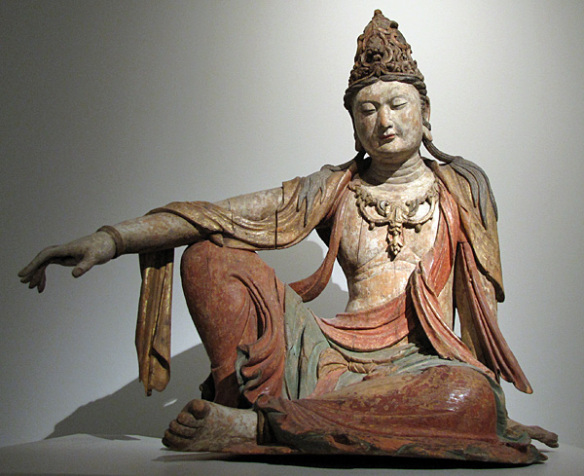 |
|
| Eleventh-century Chinese image in the Saint Louis Art Museum, photo by Christopher Axe, <https://regenaxe.com/2010/02/05/dedicated-to-art-and-free-to-all/#comment-95224> used by permission |
|
|
|
The Mahayana Bodhisattva Avalokiteshvara is the wonderful embodiment of perfect compassion and exemplifies the resolve to postpone Buddhahood until every sentient being on earth achieves liberation from suffering. In Tibet he is known as Spyan-ras gzigs ("With a Pitying Look"); in Cambodia and Thailand as Lokeshvara ("Lord of the World"); and in Sri Lanka he is known as Natha-deva. In an androgynous form, the Bodhisattva is known in China as Guanyin, in Korea as Kwan Om, and in Japan as Kannon, all of which mean "One Who Hears the Cries of the World".
This article from Lion's Roar discusses how we can skillfully and usefully incorporate compassion in our lives.
Like all Bodhisattvas, we should use upaya (skillful means) in order to act wisely and with compassion, as fits the time and place. In these dark days, not only must we be creative and principled, but the multiple crises we face urgently require swift attention and remedial action.
That action, however, must always be suitable to the situation: As Barbara O'Brian puts it: .
|
|
|
Upaya can be unconventional; something not normally associated with Buddhist doctrine or practice. The most important points are that the action is applied with wisdom and compassion and that it is appropriate in its time and place. The same act that "works" in one situation may be all wrong in another. However, when used consciously by a skilled bodhisattva, upaya can help the stuck become unstuck and the perplexed to gain insight. |
|
|
|
|
|
|
There was a notable example of compassion in the news in July:
 |
|
|
|
|
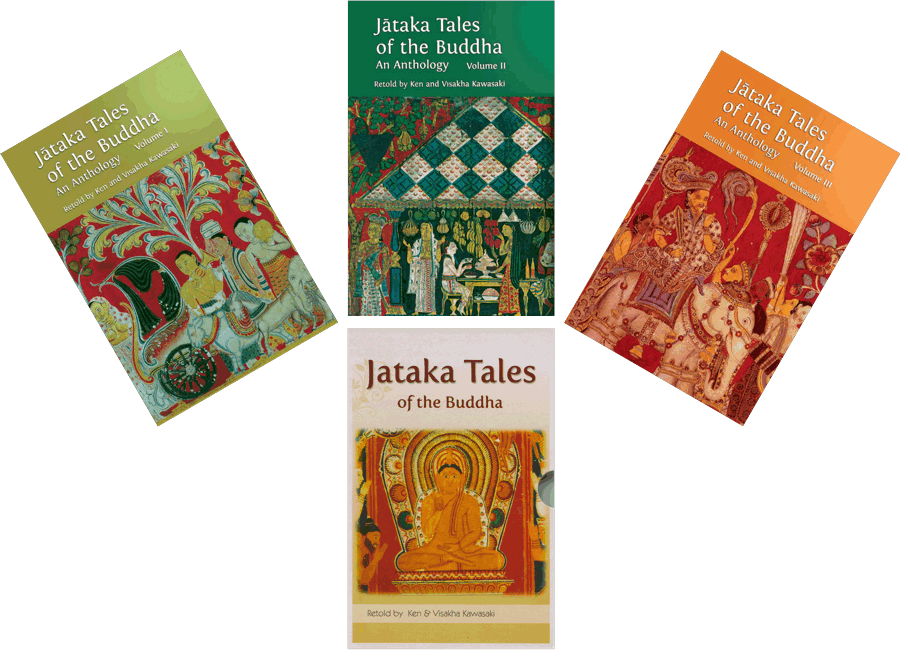 |
|
|
Jataka Tales of the Buddha
An Anthology
|
|
|
Retold by Ken and Visakha Kawasaki
|
|
|
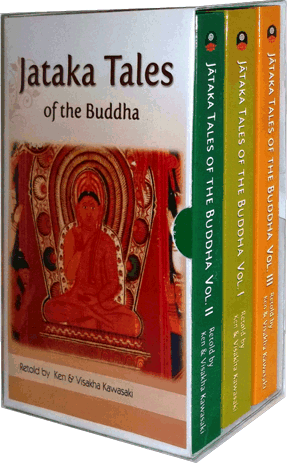 |
|
|
A wonderful gift!
|
|
|
|
|
|
|
|
|
|
|
|
|
|
|
A Rainless Cloud
The Buddha said, "There are three kinds of persons in the world. What three? One who is like a rainless cloud, one who rains locally, and one who rains everywhere.
"What kind of person is like a rainless cloud? A certain person never gives to anyone. He does not give food, drink, clothing, garlands, incense, medicine, lodging, or lamps to ascetics, the poor, or the needy. This kind of person is like a rainless cloud.
"What kind of person rains locally? A certain person gives to some but not to others. He gives food, drink, clothing, garlands, incense, medicine, lodging, and lamps only to some ascetics and to some of the poor and the needy, but not to others. This kind of person rains locally.
"What kind of person rains everywhere? A certain person gives to all. He gives food, drink, clothing, vehicles, garlands, incense, medicine, lodging, and lamps to all ascetics and to the poor and the needy. This kind of person rains everywhere.
"These are the three kinds of persons in the world."
--Itivuttaka 75
|
|
|
|
|
|
|
|
|
|
|
Flattening the Curve
COVID-19 and Climate Change
Everyone has now heard of "flattening the curve," the call for collective action to limit the worst effects of COVID-19. Advocates of climate action have begun to note the uncanny similarities between unchecked climate change and the pandemic, including the challenges brought by exponential growth, increased public awareness of the problem, and the imperative of a unified public response. Pandemics know no boundaries, and neither do the effects of climate change. Both pandemics and climate change have the most impact on vulnerable communities; but ultimately they affect us all. Both jeopardize the safety, well-being and inherent dignity of those affected. And both trigger legal and ethical obligations of governments and the private sector to protect and safeguard the civil, political, economic, social and cultural human rights that pandemics and climate change threaten equally. Because climate change, like COVID-19, is a global problem with local consequences, addressing it will require a collaborative and coordinated set of solutions implemented locally, nationally, regionally and internationally. Attorneys have a major role to play by writing and advocating for meaningful change. In this webinar, speakers described the lessons COVID-19 has taught us about the need for an effective global response; and they identified a variety of legal actions governments and the private sector must take to "flatten the curve" and keep the worst effects of climate change at bay.
-- American Bar Association
|
|
|
|
|
|
|
|
|
|
|
|
|
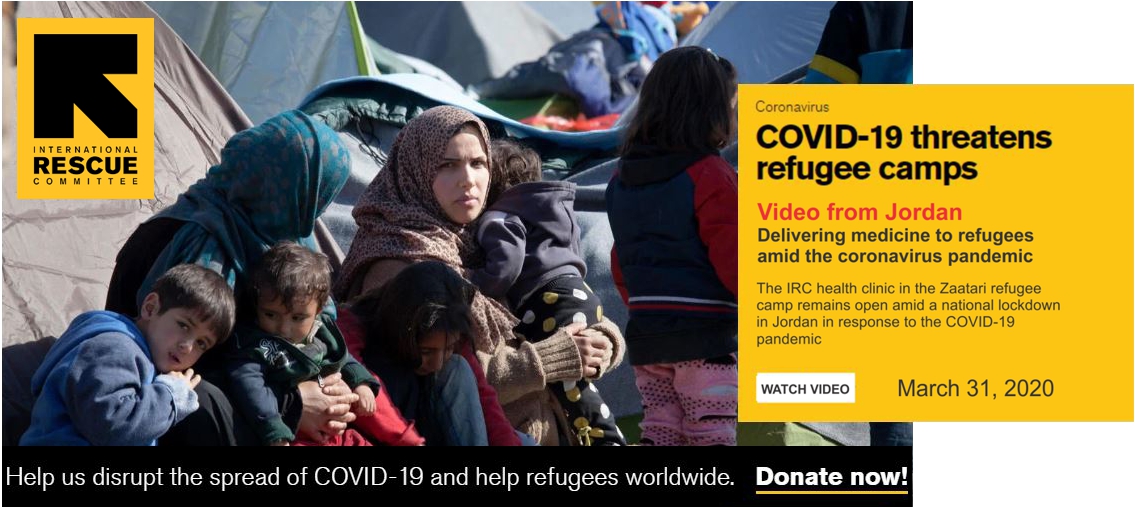
On July 18, United Nations Secretary-General António Guterres delivered the Nelson Mandela Annual Lecture 2020 speech, entitled, "Tackling the Inequality Pandemic: a New Social Contract for a New Era," in which he eloquently addressed problems of inequality, justice, racism, sexism, climate change, and much more. You can listen to the speech or read the transcript by clicking on the following links.
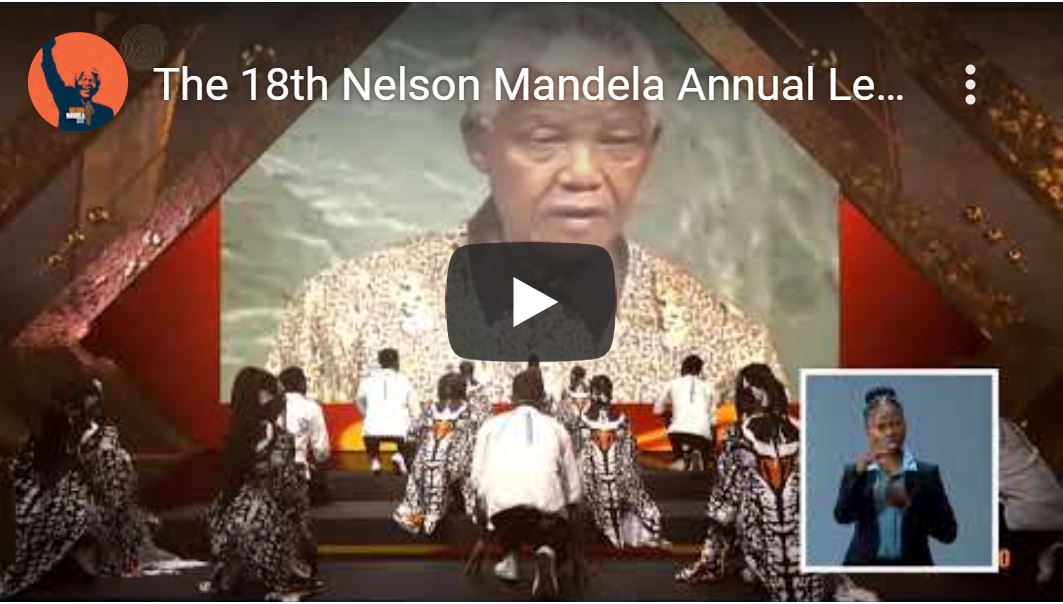 |
 |
|
|
Annual Lecture 2020
New York, 18 July 2020
|
|
United Nations Secretary-General
António Guterres
Tackling the Inequality Pandemic: A New Social Contract for a New Era
Full Transcript
|
|
|
|
|
|
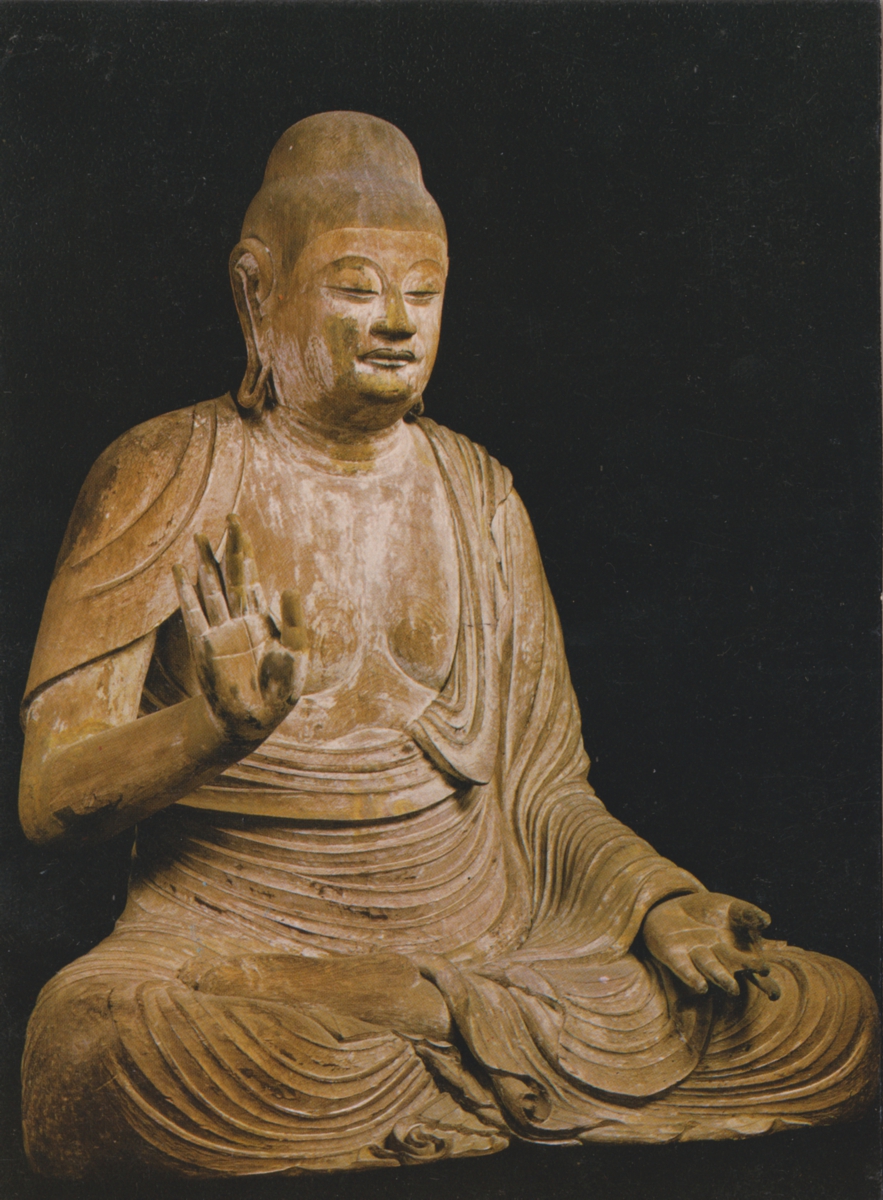 |
|
|
|
Coronavirus and Spiritual Practice
By Ewen Arnold
Metta Meditation
Let's begin by opening our hearts to all the suffering that we are now aware of, caused by coronavirus, or caused by other factors, like poverty or war.
The way I open my heart these days is just to picture someone whom I'm missing at the moment-- someone whom I love and I'd love to see again. So I'm picturing my father, who's 93, and very frail with lots of health issues. I'm picturing what it would be like when I next see him. Seeing him from a distance, seeing him smile and laugh, rushing towards him, and hugging him close. Hearing his voice, and just hugging him, hugging him. I can even imagine the conversation that we're going to have and exactly how I will feel at that time.
Read the complete essay
|
|
|
|
Shakamuni Buddha, Ninth century, wood, Muroji, Nara, Japan
|
|
|
|
|
|
|
|
|
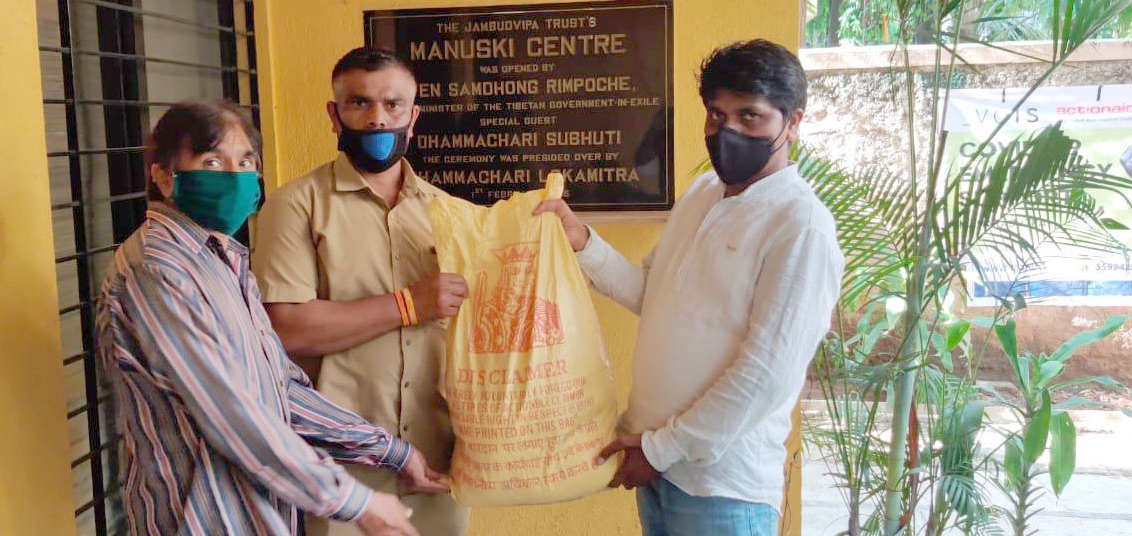 |
|
| Click the photo to see more photos of the Manuski distribution of food |
|
|
|
When India suddenly imposed a lockdown, hundreds of thousands of migrant workers found themselves completely stranded. Of course, their jobs disappeared, but they had no homes where they could quarantine themselves. Without work, they had absolutely no income, and, of course, no savings to fall back on. Almost all were hundreds of kilometers from their families, but public transportation was also stopped. There was no option but to begin walking toward their home villages, of course, in many cases carrying the virus with them, thus infecting remote, rural areas too. A few days after we heard of this on the news, we received an appeal from True Dharma in Florida for donations to alleviate the suffering of these poor migrant workers. The director, Frank Tedesco, suggested that we donate directly to Manuski, the organization in Maharastra arranging the relief efforts. Fortunately, we had some funds already in India, so it was easy to send a donation. In their response, they sent many photos of their distribution of food to the needy migrants.
In continued correspondence with Steve and Calvin, we have learned that both of them are well and, so far, safe from the virus.
|
|
|
In Michigan, Steve is dealing with the plight of many of the millions in prisons in the United States, where the virus is running rampant. In April, he wrote:
When prison administrators imagined open setting housing, I don't believe they ever imagined the situatiion we currently find ourselves in. We have lost about one fourth of the population in this housing unit alone. We've been kept fairly isolated from those in other housing units, so I can't say with any certainty that the same can be said for the other housing units. But I do know that there have been a number of prisoner transfers to prisons with empty housing units and at least 3 prisoners from this facility have died thus far from the virus.
I am doing the work of 4 housing unit workers. It may be all the working throughout the day, keeping my metabolism up which keeps the virus at bay. :-) I consider my efforts as service to the community. My efforts ensure that those who fell ill will still have their assignments when they return. I'm told that we will receive "hazard pay" which is an extra $2 a day (I currently make $1.31 a day) and that will certainly come in handy. But I work all day and my two off days which I'm not compensated for. One of the prisoners that works with me, had a heated discussion with our second shift regular officer yesterday about that. The officer was getting upset, so I interjected myself and calmed the prisoner down. I explained to him that such decisions were out of the officer's hands, and to try and see his extra efforts as a service for himself and his buddies that reside in our housing unit. We are still here and still need to maintain a clean housing unit as much as possible. To just let it all go would be irresponsible. He seemed to see the logic in all that.
In July, he wrote:
For the most part, it seems that the virus has stabilized within this prison system (Michigan). There may only be 3-7 new cases reported each week- versus the 100's each day about a month ago. We are still somewhat locked down though. We go to the dining hall to pick up meals to bring back to our bunks to eat. There's no programming other than college for a handful of "short-timers" and Law Library at one-quarter previous capacity. Each side of the prison is still kept separated. But we are having recreation yard with all the housing units on this side of the prison. Still no religious services though. I'm able to converse with two of our members who are on this side.
|
|
|
|
Calvin is still finding adjustment to "freedom" challenging.
These are excerpts from letters we received in July.
On so many levels, my transition has been shocking, fun, difficult and transformative. I planned for years for my eventual release and had more support than most. Despite that, no words can describe how hard it is to pull together a life after nearly three decades and as a senior citizen, (almost 70). In the midst of having to learn about new technology I have to create a new circle of friends and family. All the credit and reputation I earned in various institutions does not mean anything to anyone out here in society. It is like working at a job for 30 years with an exemplary record, then having to leave that position and start anew without any reference to previous employment. At the very least it is challenging.
As crazy as it might sound, there are moments when I actually miss the routine and predictability of prison. There I knew my place within the social hierarchy and earned the respect of staff and prisoners alike. I had some influence in a place not known for compassion but was respected for my commitments and my ideals. Out here, no one knows me or what I've accomplished. It means nothing and who would care anyway? When I walk around the local Farmer's Market, or stroll around the lake, I feel like I am invisible and watching everyone as if in a movie. After living with people constantly in close proximity for so long, being alone in my apartment is really being alone but wonderful at the same time. So you see, in many ways this change for me continues to be a complex and confusing experience.
Meanwhile, every Saturday I go to the Olympia Zen Center for meditation and ceremony and then spend a couple of peaceful hours gardening around the grounds among the serene foliage and birdsongs. I often have to pinch myself to be assured that this new life is real.
|
|
|
|
|
|
|
|
|
A BRM supporter made a donation for Steve, but, because of a credit-card issue, we asked a friend to send the money, which he did before we were able to alert Steve. We were impressed that he immediately wrote to us, in surprise, and offered to return the money if it was a mistake.
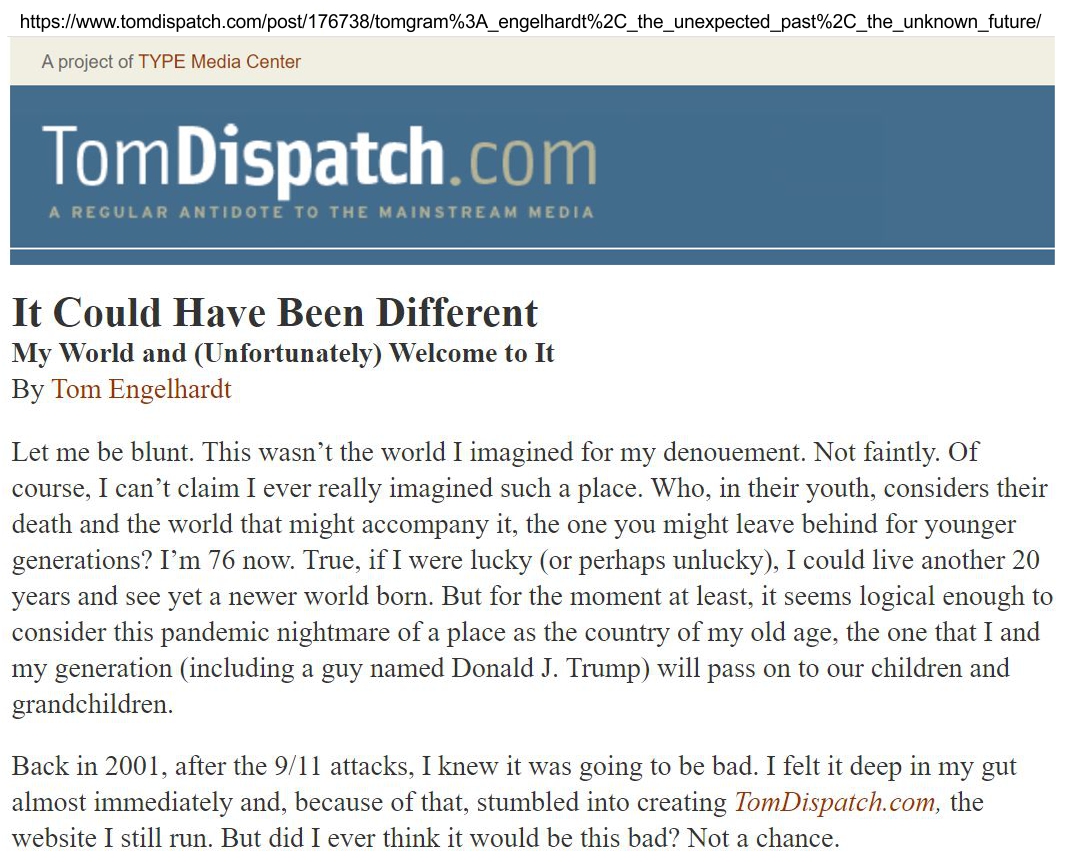 |
 |
|
|
Donations to Buddhist Relief Mission
|
|
|
|
In the United States, donations can be made by direct deposit in any branch of PNC Bank, or by electronic transfer from any other bank.
Account name: Buddhist Relief Mission
Account number: 4804658412
ABA routing number: 071921891 |
|
|
|
|
|
|
By check: Pay to Buddhist Relief Mission, A/C 4804658412
Mail to: Miscellaneous Account Services, PNC Bank, P.O. Box 8108, Philadelphia, PA 19101-8108
If depositing in PNC Bank, please send your name and the amount: to: buddhist@brelief.org
|
|
|
|
|
|
|
|
|
|
|
|
|
|
|
For several years, in every report, we have extensively covered the issues of climate catastrophe and the environment. To put it mildly, the situation has not changed. Let us simply include here four recent news items.
In June, Nimal completed the work on Ven. Nanda's Dhamma Hall, and Lily visited again with a substantial donation of food. Ven Nanda has been offered a Bodhi sapling, and we hope that we can participate in the planting and dedication of that sacred tree.
Our Sri Lankan resident visas expired in July, so, in June, amidst the pandemic and isolation precautions, we made a trip to Colombo to begin the process. This involved mandatory health checks. Surprisingly, Ken tested positive for filariasis. If you would like to read an account of that adventure, click here.
 It was in our report one year ago that we reported that President Trump intended to withdraw from the Internhational Postal Union. Now he has gone much further and is threatenting to dismantle the United States Postal Service. Unbelievable! Disgusting! Criminal!
It was in our report one year ago that we reported that President Trump intended to withdraw from the Internhational Postal Union. Now he has gone much further and is threatenting to dismantle the United States Postal Service. Unbelievable! Disgusting! Criminal!
Trump has admitted that his reason for doing so is to prevent, or corruptly disrupt mail-in voting. Of course, he is claiming that mail-in voting is fraught with fraud. The defense of this by Mark Meadows, White House Chief of Staff, is classic. (Click here to view the clip on CNN.[DISCLAIMER: This video is very long, and, frankly, sickening!])
|
|
|
Jake Tapper said, "But there's no evidence of widespread voter fraud. "
Mark Meadows replied, "There's no evidence that there's not either. That's the definition of fraud, Jake."
|
|
|
|
|
|
|
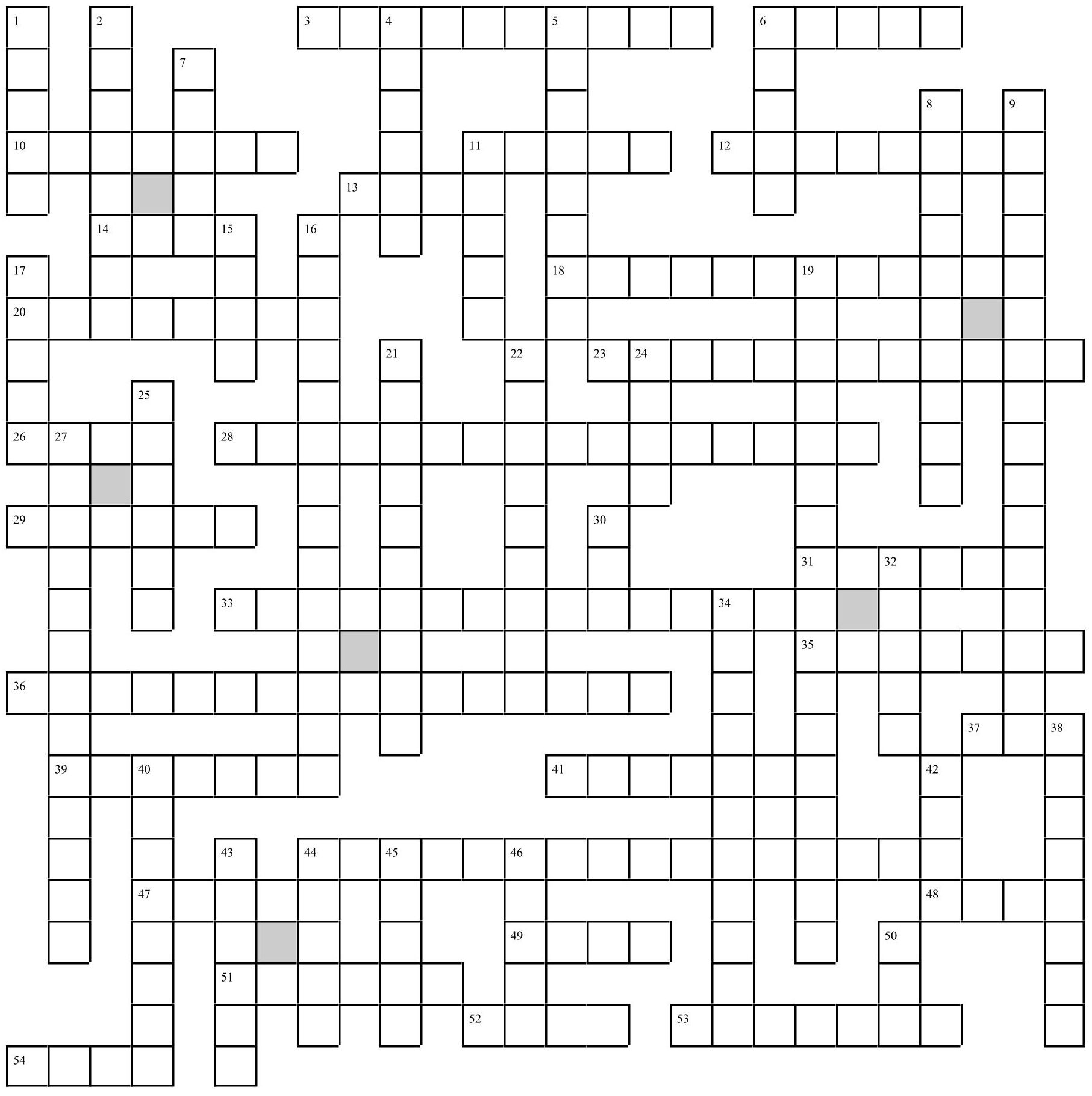 |
|
| We are not teaching any classes during the pandemic, but we try to keep ourselves busy turning out material that may someday be used. At Julia's request, we composed a Covid-19 crossword puzzle. We hope some of you enjoy it. |
|
|
|
Building on Visakha's dream, which was related in our l
ast report, since early July, we have joined with some dedicated friends in Kandy to lay the groundwork for a cooperative, which will include a thrift shop. We have held weekly meetings via ZOOM, which have been, to say the least, challenging. Our goal is to be inclusive, to support each other, to build solidarity, and to protect the environment, but we have to put that into a mission statement. We also have to decide on a name and to create a logo. We know that this process will take time. We have good advice from several experts who are helping us to do everything properly. Nevertheless, we have a dream!Our motto is "Start small, Think big!" Watch this space!
Shortly after Nezumi died, we received a beautiful framed painting from Jennie, who visited us last August. wer were very touched. It is hanging in our dining room, and Nezumi seems to be eyeing the rat below. Everyone who sees the painting is impressed at how gracefully the artist has captured Nezumi's spirit. Thank you Jennie!
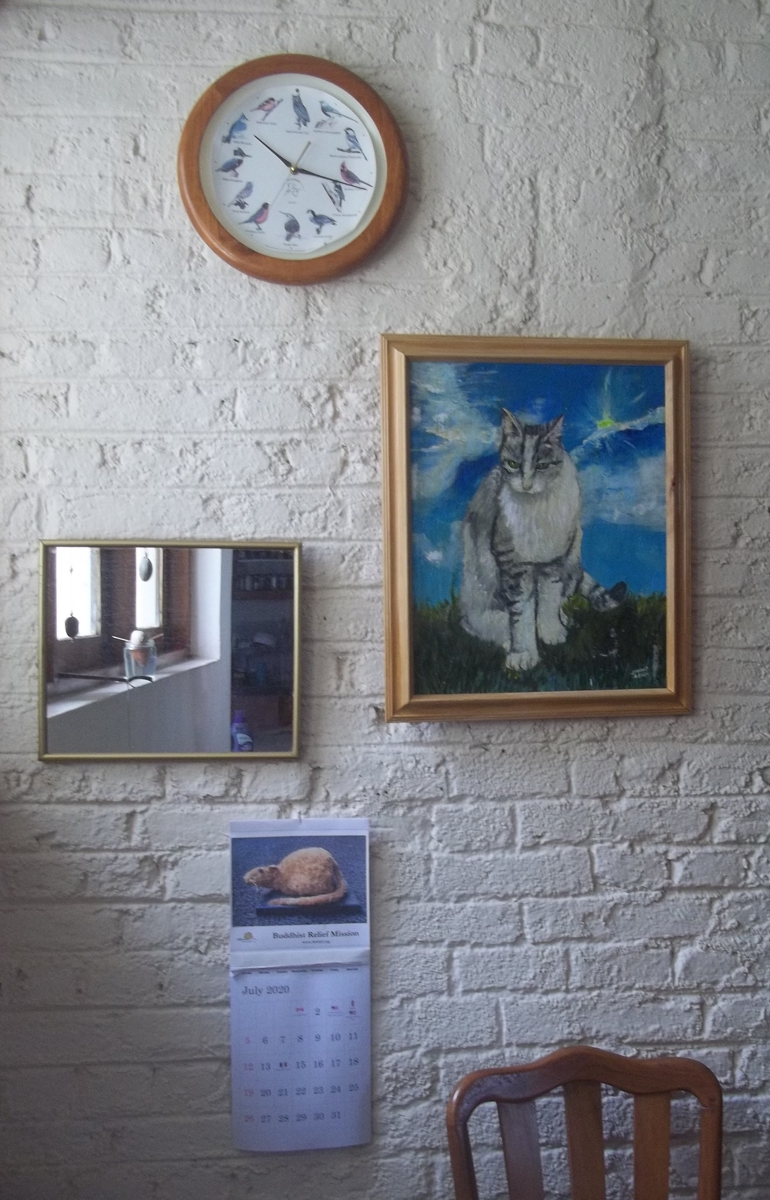
At the time the painting arrived, there was no international postal service to or from Sri Lanka, because all international flights had been cancelled due to the pandemic. The painting arrived by DHL. "Aha!" we realized. We had resigned ourselves to foregoing the Michigan primary in early August because we could not mail our ballots. A phone call to DHL confirmed that fifteen-day service was available. We quickly printed, filled in, and signed the ballots and delivered them to the office. The minimum charge for an envelope was 7000 rupees (about $40) so we included some Japanese stationery as a gift to the city clerk who has always made sure that we received our ballots for every election. Thank you!
|
In Memoriam
|
|
|
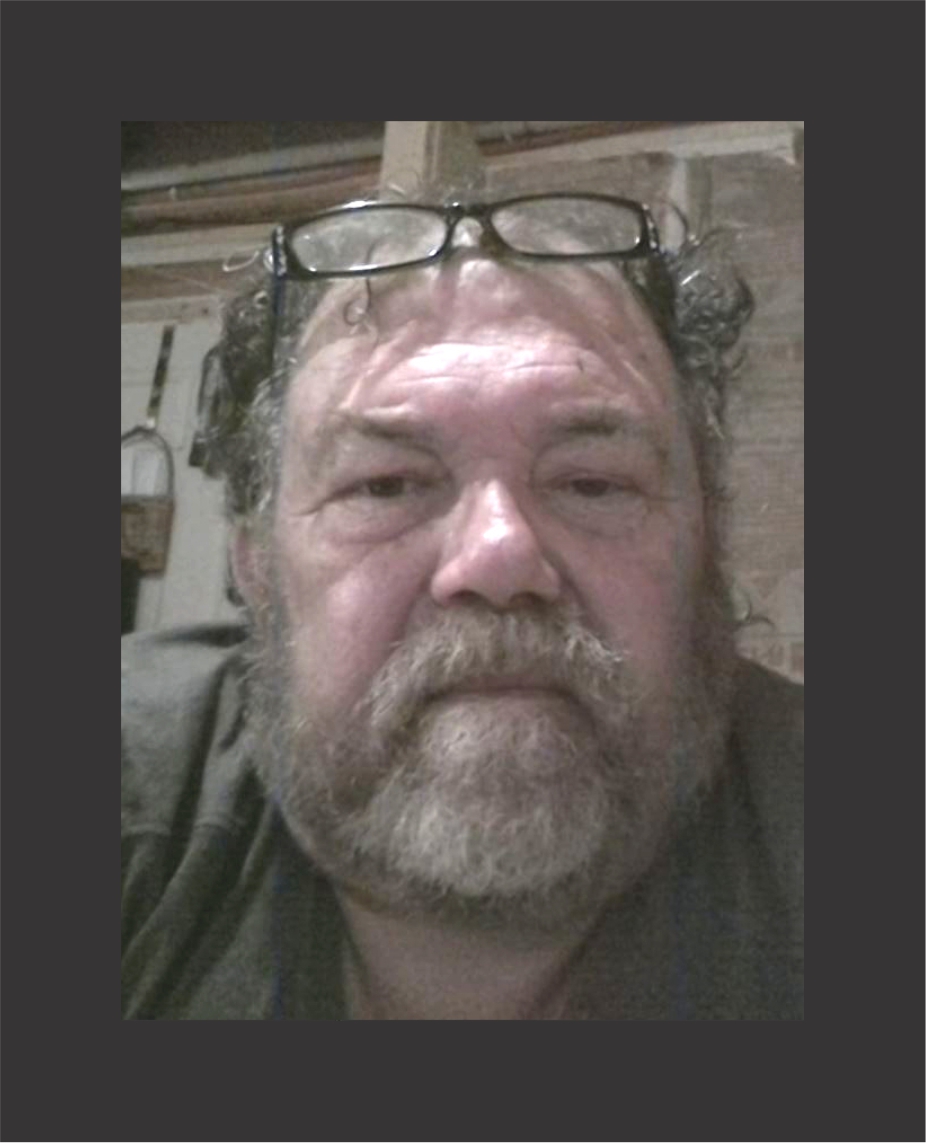 |
|
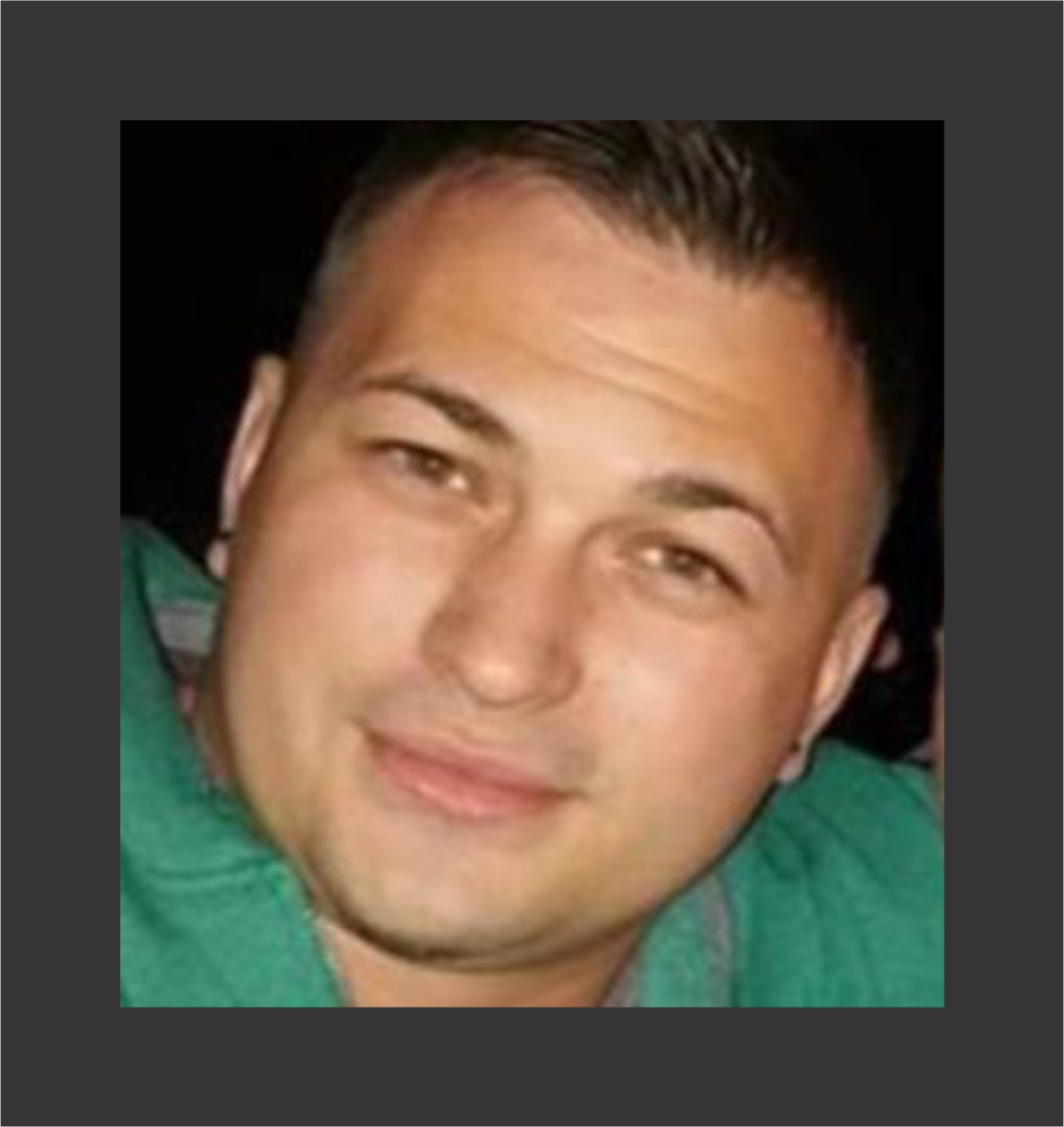 |
|
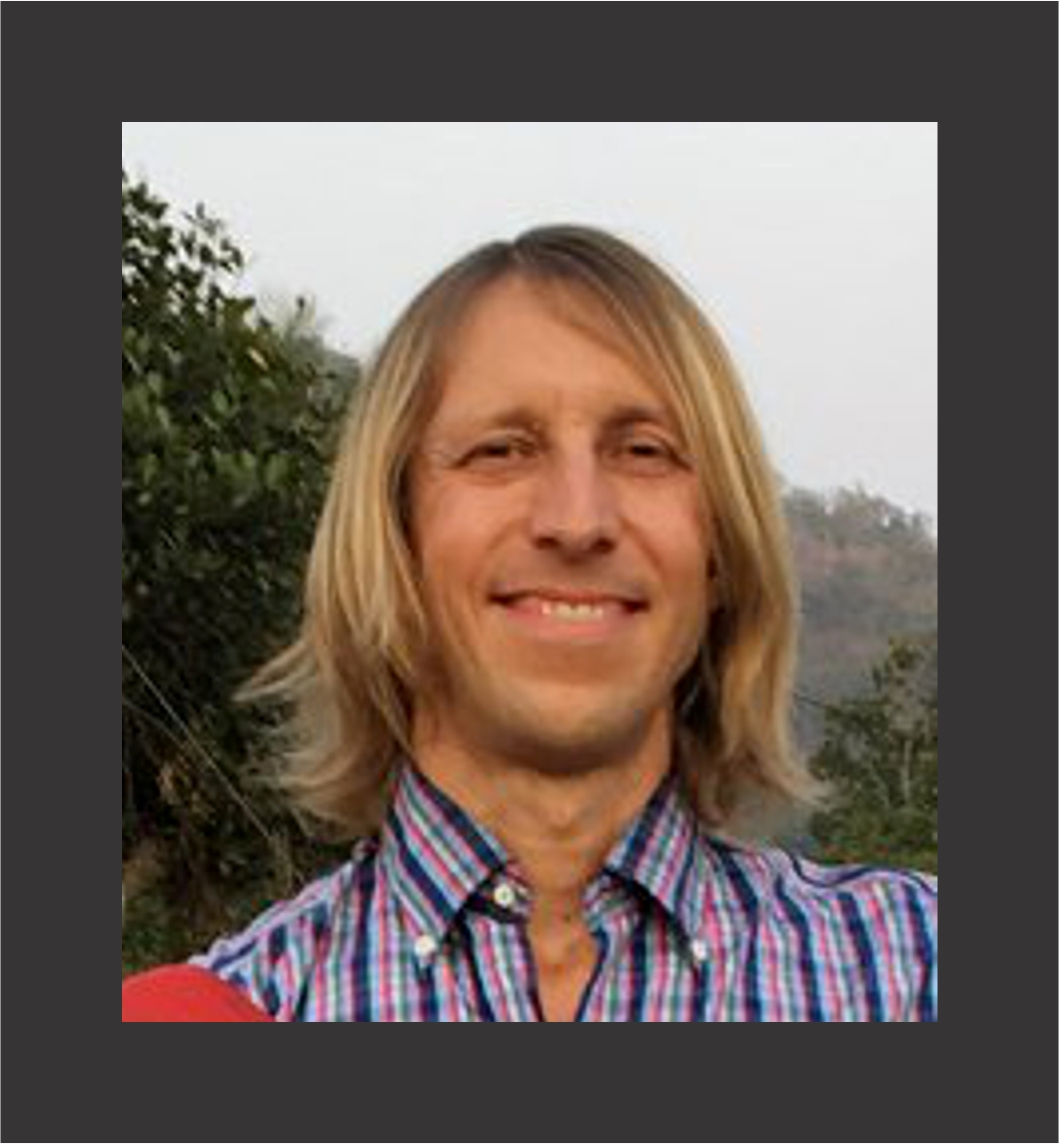 |
|
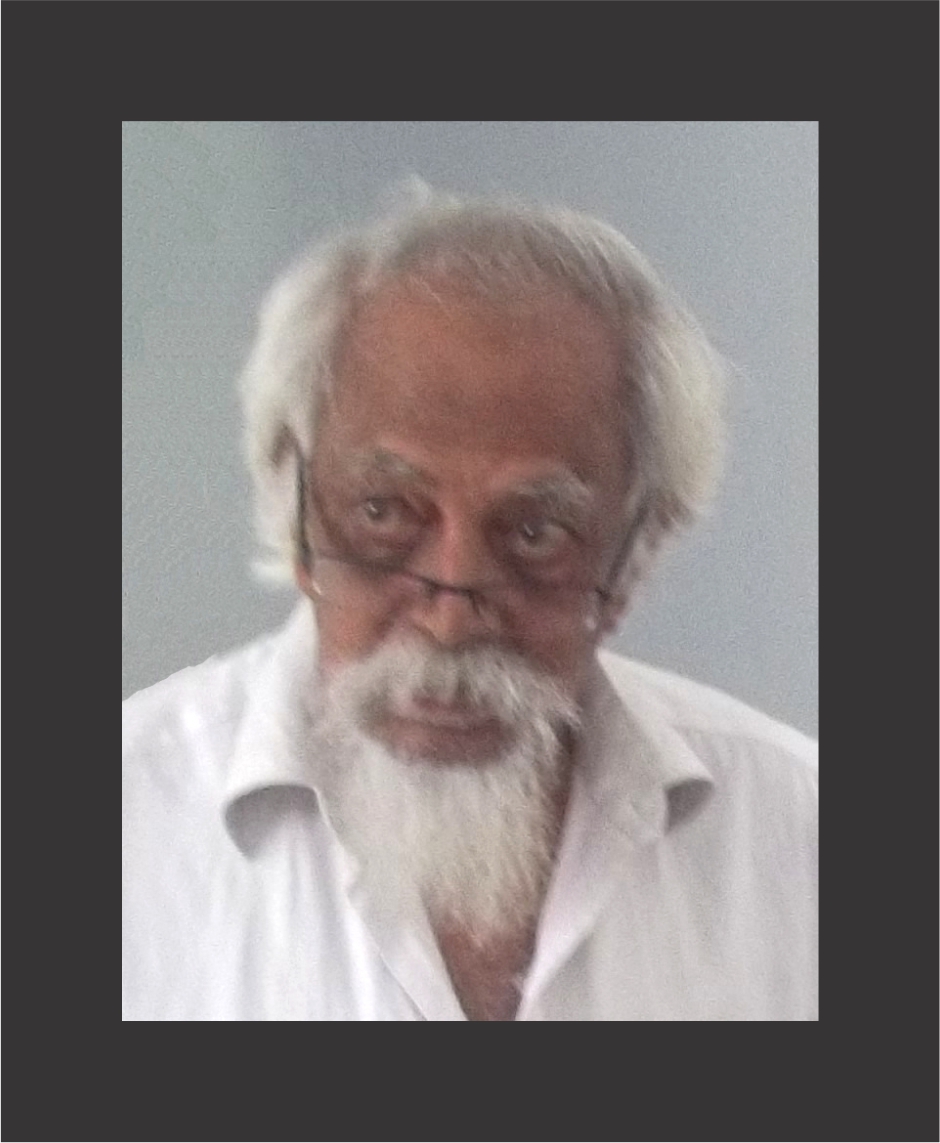 |
|
| Terry D. Kawasaki, son of Ken's brother, Julius, killed in a car accident on June 18, 2020 |
Austin Gabriel Kawasaki, grandson of Ken's brother, Julius, passed away on July 8, 2020 |
Weston Elliot Strickler, graduate student at University of Peradeniya, passed away on July 23, 2020 |
Neil Omeon Mendis, father of Dushy, passed away on August 13, 2020 |
|
|
|
|
|
|
|
|
|
|
|

 On the island of Sumatra, in spite of local officials and government authorities, the residents of a village in Aceh, ordinary fisherfolk and farmers, opened their hearts, their homes, and their mosques to a boatload of exhausted, desperate Rohingya refugees.
On the island of Sumatra, in spite of local officials and government authorities, the residents of a village in Aceh, ordinary fisherfolk and farmers, opened their hearts, their homes, and their mosques to a boatload of exhausted, desperate Rohingya refugees.
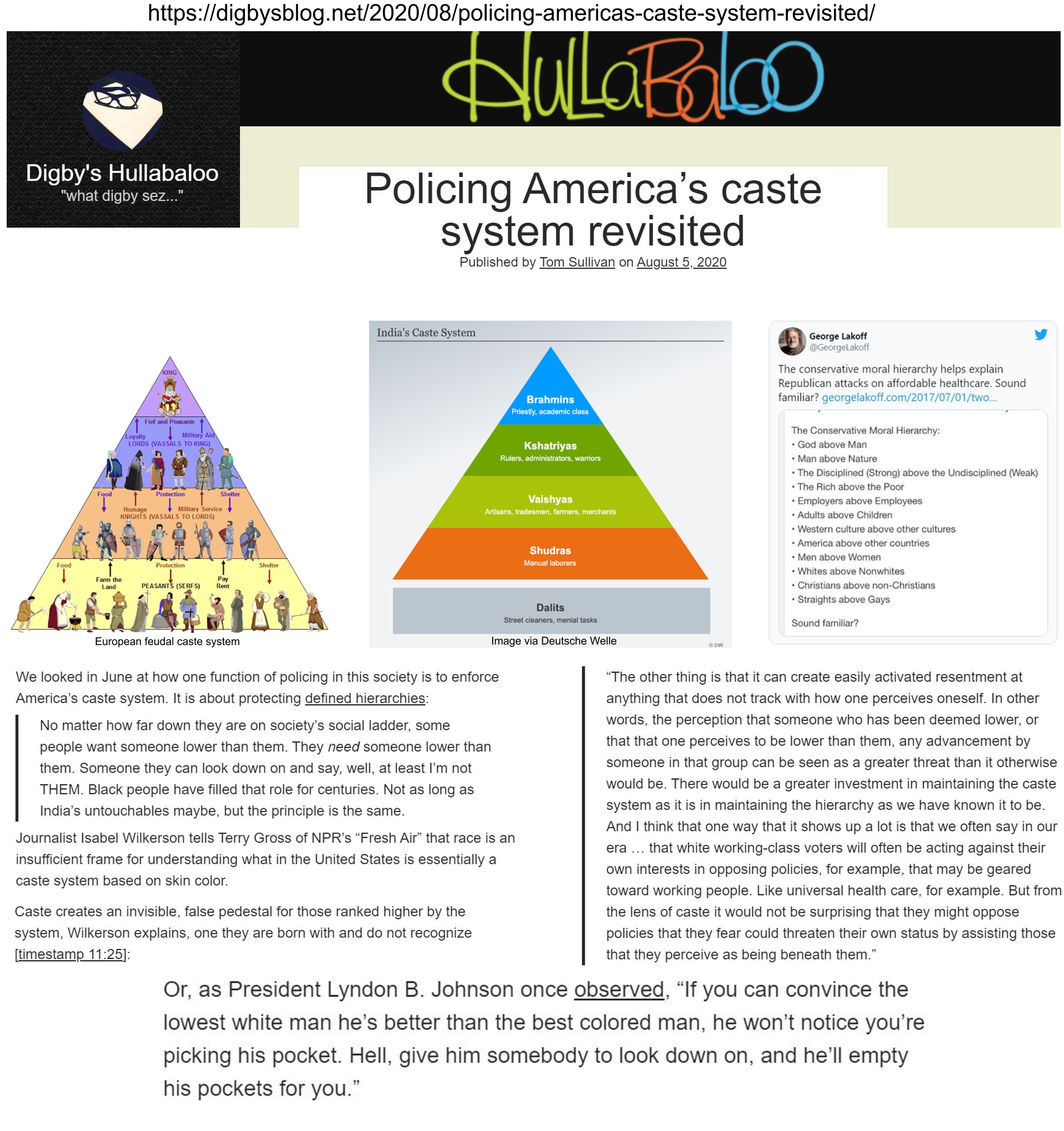







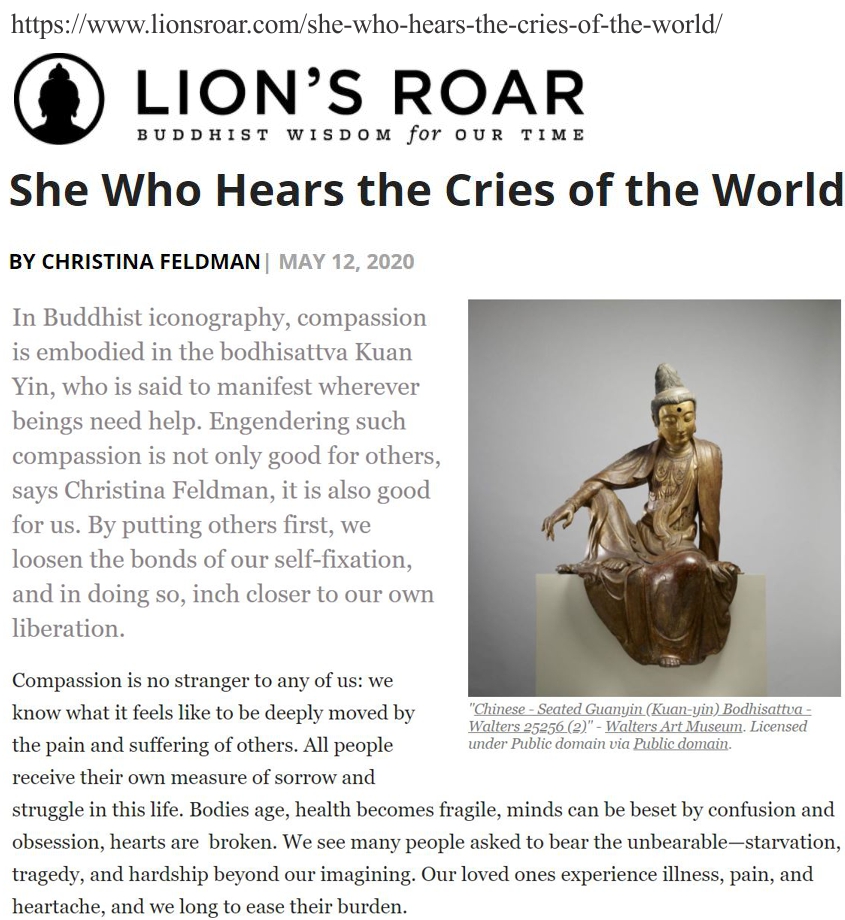








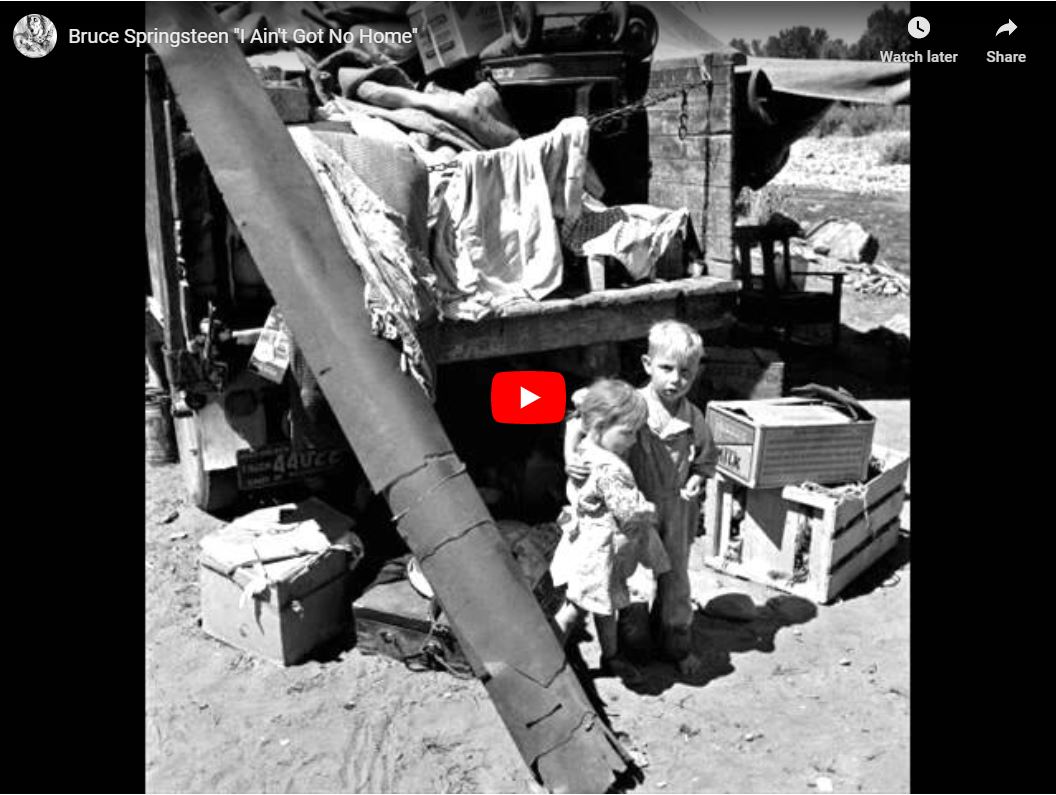

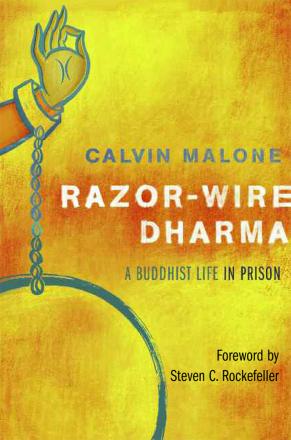





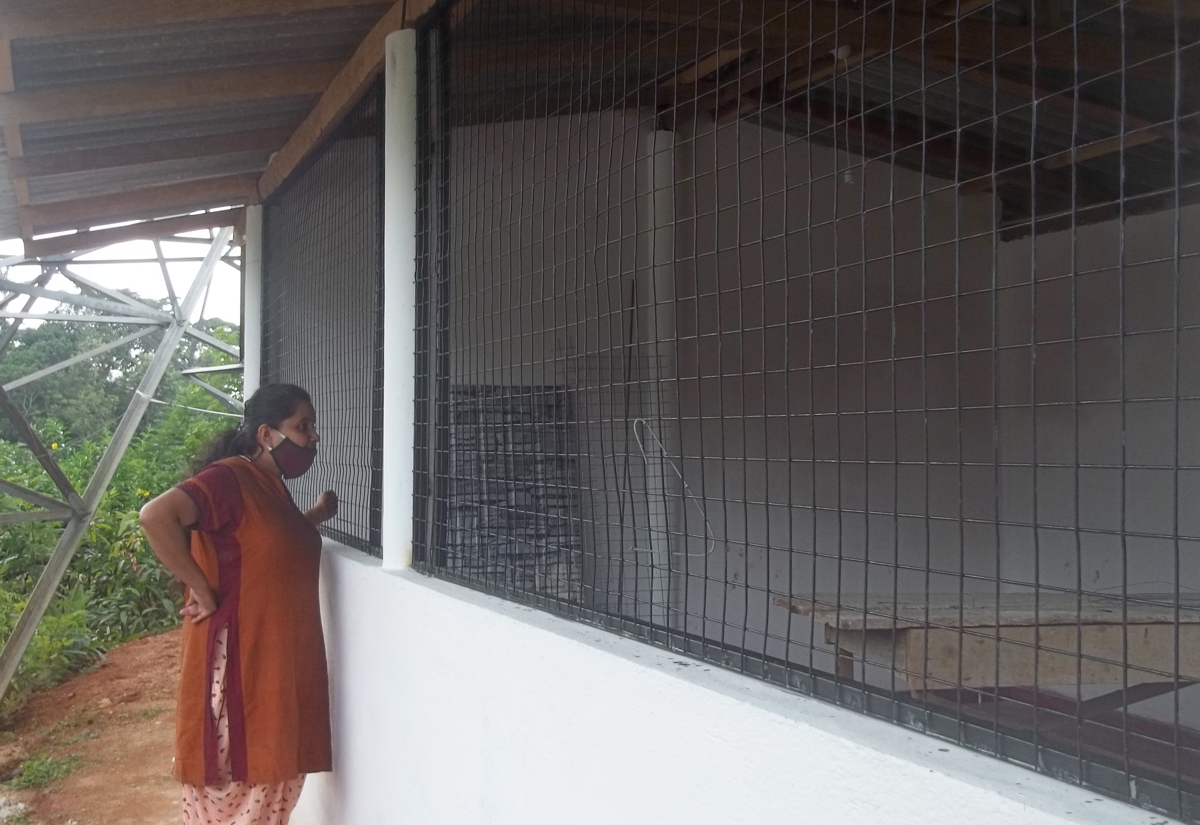
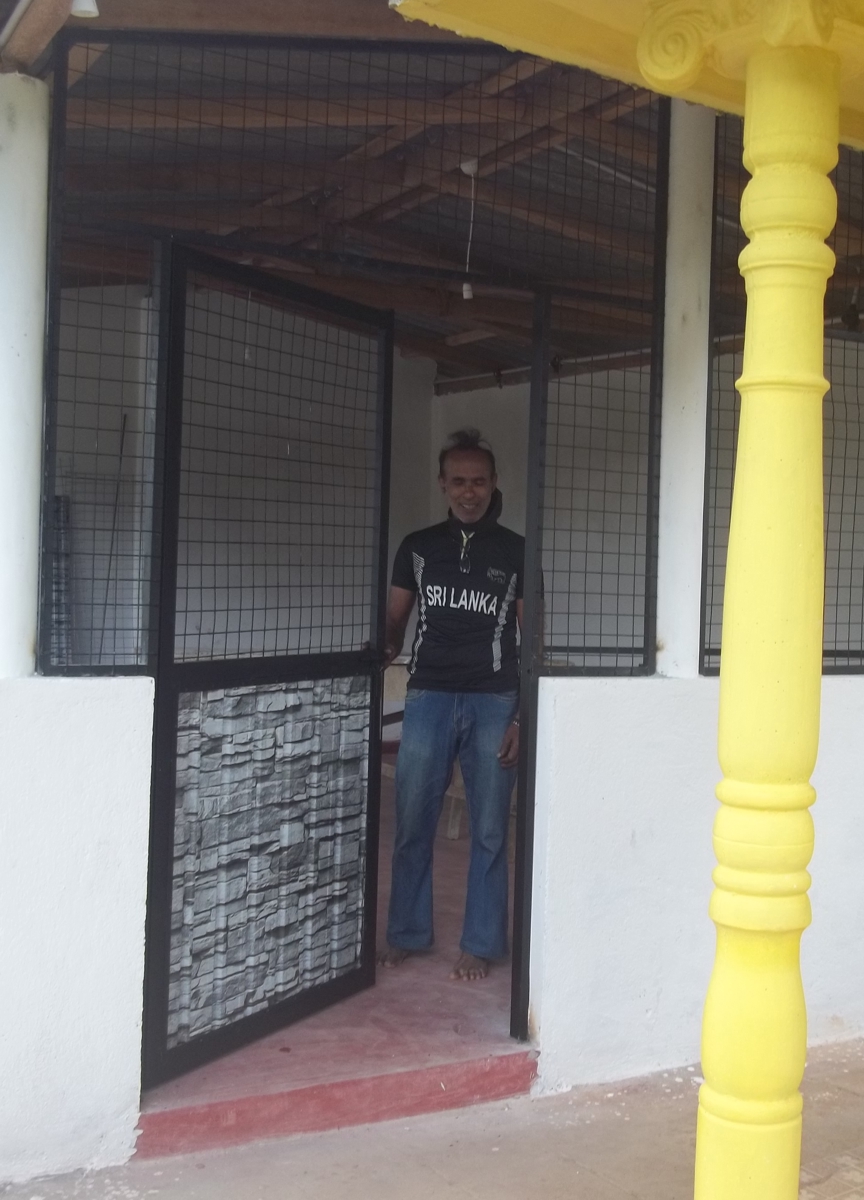
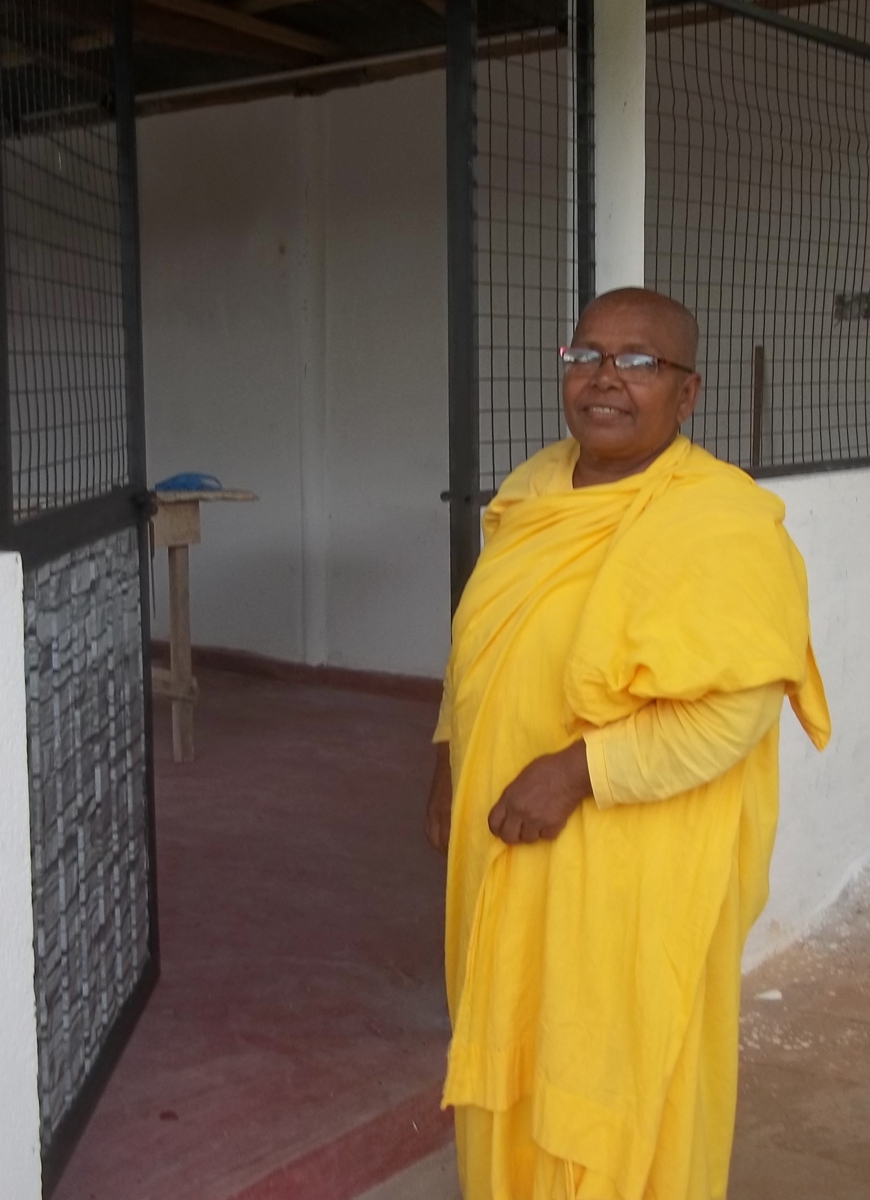
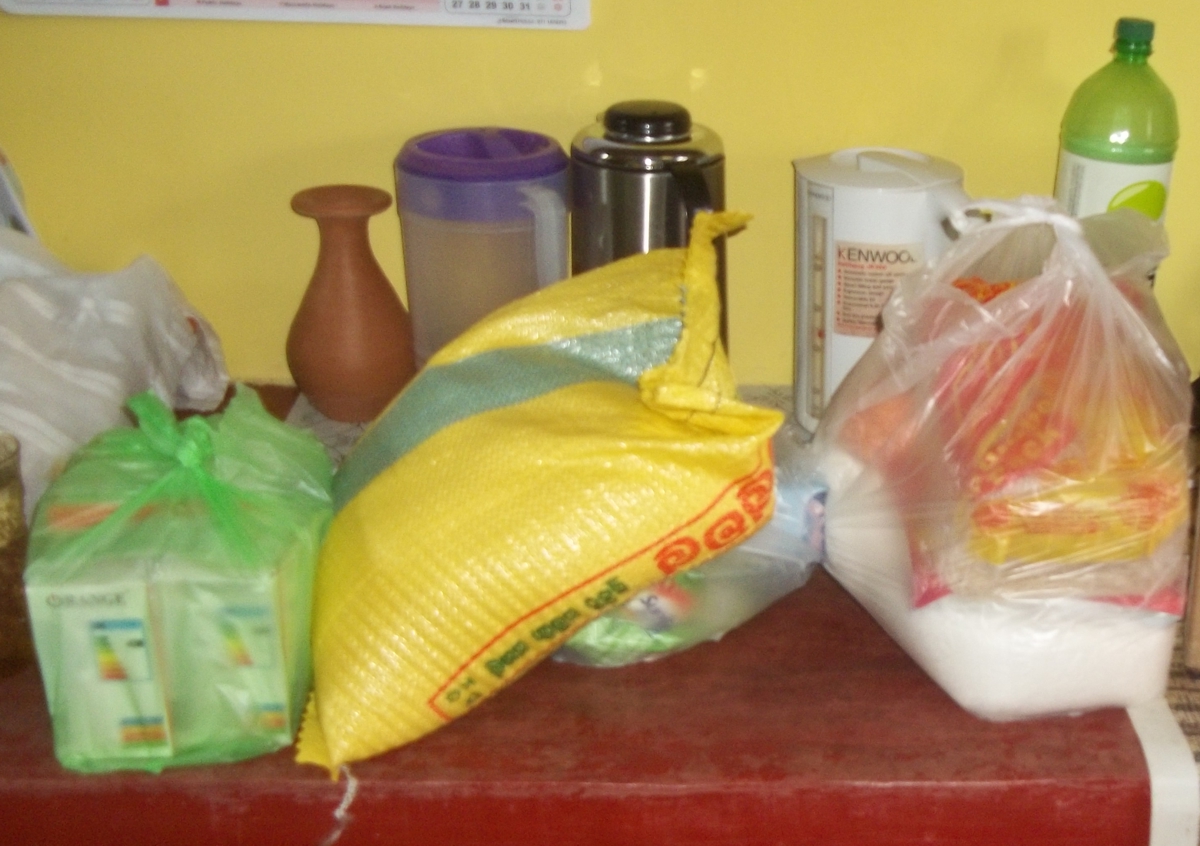


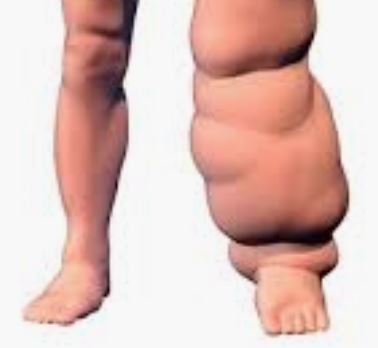
 It was in
It was in 